

How to Start a Mini Supermarket in Kenya

A mini-supermarket is among the profitable businesses in demand in Kenya. You can start with a retail shop, then a wholesale shop, and then expand to a mini supermarket. A mini-supermarket is a business that is doing well in residential and fast-growing towns.
Kenyans are moving away from supermarkets and opting to shop at mini-marts. With a good business location, startup capital and strategy, a mini supermarket is a profitable business to start in Kenya .
Do a Market Research
Before starting a mini supermarket, it is advisable that you do market research. When doing market research, you try to find out what the fast-moving goods are, a good business location, startup capital , competition and if it is worth starting the business.
Carrying out market research will help you determine if the business is viable before investing your money . This way, you will avoid making losses.
Write a Mini Supermarket Business Plan
If you have carried out market research, it is easier to write a business plan . A business plan helps you plan your ideas and your finances . A Mini supermarket business plan should highlight the following:
- Business location
- Business name
- Startup capital
- Sources of capital
- Business opportunities
- Business risks and weaknesses
- Mini supermarket product list
Identify a Good Business Location
One of the factors that affects the success of any business is its location. A mini supermarket is best suited for residential areas in the fast-growing towns. Also, look for a location where there is no high competition. For instance, there is no use in setting up a mini supermarket next to a supermarket due to high competition.
You can set up your mini-mart near institutions like colleges and universities . A mini supermarket can also thrive well next to a petrol station where travelers can drop and shop.
Acquire Necessary Business Permits
You need to ensure that your mini supermarket is licensed and meets all the legal requirements. For instance, you need to register a business name for your mini supermarket. You can register the business name on eCitizen for only Ksh 1,000. This will ensure that no other business can use your business name.
You need the following business permits and licenses to operate a mini supermarket in Kenya:.
- Single Business Permit. You need a single business permit to operate any business in Kenya. You can get it from County Council Offices for an average cost of Ksh 7,000.
- Health License. You also need to have a health license since you will be dealing with foodstuffs. A health official will be sent to your business premises to inspect if it meets all the health standards.
- Fire and safety certificate. You need to have fire-handling equipment like fire extinguishers to get this certificate.
Read also: How to start a grocery store in Kenya.
Branding and Partitioning
You need to brand your mini supermarket and partition it in such a way that it looks appealing. Make sure there are shelves where you can display items. Make sure to place items in their right places.
Have a place for foodstuffs and non-food stuff. This makes your mini supermarket look organized and makes it easy for customers to locate items.
It is also good to have price tags for all goods displayed on the shelves. This will make it easy for customers to know the prices for your products. Finally, ensure that your business has enough lighting and is well ventilated.
How Much Do I Need to Start a Mini Supermarket
The cost of starting a mini supermarket in Kenya depends on the business location and the size of your business. Starting a mini supermarket in a city like Nairobi can be expensive due to high expenses like rent. However, you can start a mini supermarket with a startup capital of Ksh 800,000.
The following is a breakdown of the startup capital
- Rent – Ksh 40,000
- Licenses – Ksh 15,000
- Stock – Ksh 500,000
- Branding and partitioning – Ksh 100,000
- Marketing – Ksh 50,000
Mini Supermarket Product List in Kenya
You need to stock the following products in your mini supermarket in Kenya:.
- Household items
- Fresh produce
- Bakery products
- Soft drinks
- Kitchenware
- Stationery
Is the Mini Supermarket Business Profitable in Kenya?
The profit margin for a mini supermarket is usually between 15% and 30%. This makes it a profitable venture . The demand for mini supermarkets is high since many Kenyans prefer to shop here. This makes a mini supermarket a profitable business if you find a good business location.
One of the ways to make it in this business, is by being unique. Make customers find a reason to shop in your mini-mart. You can offer excellent customer services to attract and retain customers. Finally, make sure to stock fast-moving goods to avoid losses due to product expiration.
For business consultancy, strategic planning, organizational development, market research, financial management & accounting, risk management and business plan writing at an affordable fee, please reach out to us through a phone call 0728 621 138, or WhatsApp , or email: [email protected]
Launch Your Mini Supermarket
Once everything is set, you can now open the doors to customers. When your business is new, you are not likely to have many customers. But as your business gains popularity and customers learn about its existence, you will be getting many more customers.
Market Your Mini Supermarket
It is best that you market your mini supermarket so that you can get customers. Some of the ways you can market are through social media , word of mouth, customer referrals, signs and posters and pamphlets. The best way to attract customers to your business is by offering excellent customer service, and customers will refer other potential customers.
- How to start a boutique business in Kenya
- How to start a hardware business in Kenya
- How to start a photography business in Kenya
Get in touch
For business consultancy, business plan writing, market research, strategic planning, risk management, financial management & accounting at an affordable fee, please reach out to us through:
- [email protected]
- +254 728 621 138
- 1503 -01000, Thika KIBS Plaza, Thika

- Play group notes and exams
- pre-primary 2 notes and exams
- pre-primary 1 notes and exams
- Grade 1 notes and exams
- Grade 2 notes and exams
- Grade 3 notes and exams
- Grade 4 notes and exams
- Grade 5 notes and exams
- Grade 6 notes and exams
- Grade notes and exams
- Grade 8 notes and exams
- Form 1 notes and revision exams
- Form 2 notes and revision exams
- Form 3 notes and revision exams
- Form 4 notes and revision exams
- KCSE Marking Schemes
- set book guides
- secondary school schemes of work
- pre-primary 1 (pp1) schemes of work
- pre-primary 2 (pp2) schemes of work
- grade 1 schemes of work
- grade 2 schemes of work
- grade 3 schemes of work
- grade 4 schemes of work
- grade 5 schemes of work
- grade 6 schemes of work
- grade 7 schemes of work
- grade 8 schemes of work
- kasneb cpa revison kits questions and answers
- kasneb past papers
- 2023 KASNEB Fee Structure download
- Kenya Business Plans
- Crop and animal production guides
- Kenya Cookbook and recipes
- Novels and Story books
- kids story books
- guides and insight
- April Holiday Assignments NEW
- Business Plans
GUIDE TO START A SUPERMARKET BUSINESS IN KENYA
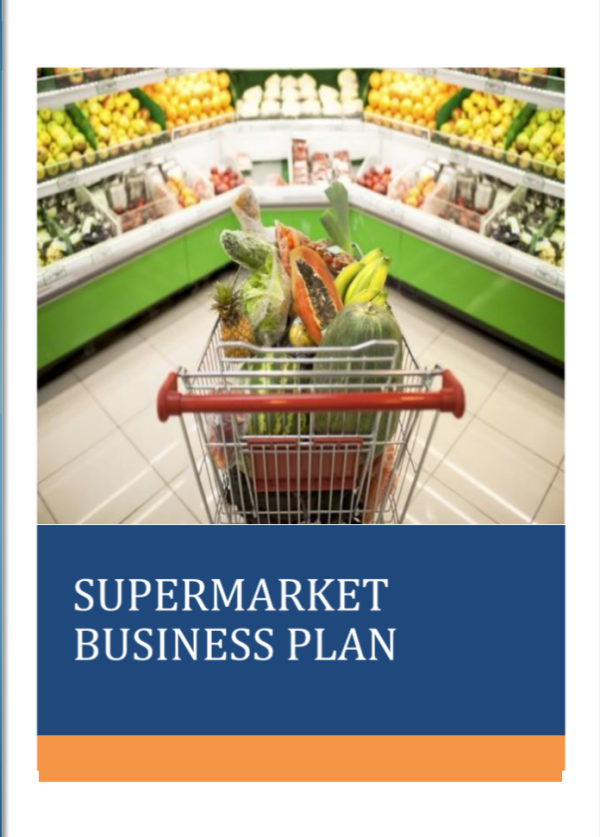
A mini supermarket is among the profitable businesses in demand in Kenya. You can start from a retail shop and then to a wholesale shop and expand to a mini supermarket. A mini supermarket is a business that is doing well in residential and fast-growing towns.
Description
The profit margin for a mini supermarket is usually between 15% and 30%. This makes it a profitable venture. The demand for mini supermarkets is high since many Kenyans prefer to shop here. This makes a mini supermarket a profitable business if you find a good business location.
One of the ways to make it in this business, is by being unique. Make customers find a reason to shop in your mini-mart. You can offer excellent customer services to attract and retain customers. Finally, make sure to stock fast-moving goods to avoid losses due to product expiration.
All business plans have 5 basic pieces of information. They include a description of your business, an analysis of your competitive environment, a marketing plan, a section on HR (people requirements) and key financial information .
MORE BUSSINESS PLANS
Related Posts:

Related items
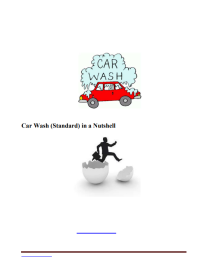
GUIDE TO START A CAR WASH BUSINESS IN KENYA
If you are looking to start a car wash business in Kenya, we prepared this guide just for you.
Here you will find all the information you need to succeed. There are hundreds, if not thousands of car washes in Kenya today and the industry is constantly growing every year, so it’s a great business idea if you are looking to start something new.
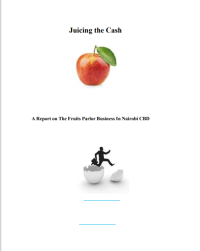
GUIDE TO START FRUIT PARLOR BUSINESS IN KENYA
Unlike a decade ago, most Kenyans are turning to healthy living. Nutritionists recommend eating a fruit (or several) daily to strengthen your immune system.
The fruit vending business is rapidly growing and many entrepreneurs are investing in this business. To remain competitive and relevant, do a thorough research on the source of supply, location and marketing strategies for the business. At the business premises, maintain high levels of cleanliness to attract and maintain customers. From our desk, we wish you all the best as you embark on starting a fruit vending business.
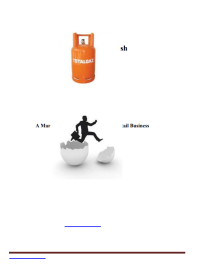
GUIDE TO START GAS RETAIL BUSINESS IN KENYA
The use of LPG (Liquified Petroleum Gas) in cooking in Kenya is increasingly in demand, since many people in urban areas prefer to use gas for cooking. Recently, there has been the establishment of many LPG companies to meet the demand for gas. Since gas is becoming an essential commodity in households, and starting cooking gas business in Kenya to provide gas will earn you good profits. If you wish to start a gas refilling business in Kenya, it is an excellent idea.
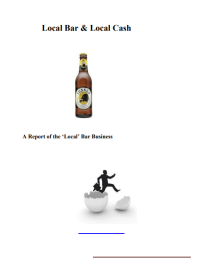
GUIDE TO START A BAR BUSINESS IN KENYA
Putting up and running your own bar sounds like a good business idea in Kenya at the moment. But are you up to it?
Running your own bar requires careful planning, hard work and long hours. All you have to do is research carefully and set your goals properly. on this Guide, we are going to highlight some of the factors you have to put into consideration before starting a bar business in Kenya.
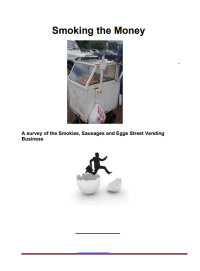
GUIDE TO START A SMOKIES AND EGGS BUSINESS IN KENYA
The eggs, sausages, and smokies business is a small-scale business that is gaining popularity in the country. With the high rates of unemployment in Kenya, people are turning to self-employment and enjoying its flexibility. If you want to be your own boss and start making good profits, this article will take you through how to start an eggs, sausages and smokies vending business in Kenya.

GUIDE TO START GIFT SHOP BUSINESS IN KENYA
Gifting is a pleasure for both the recipient and the giver. We all have received gifts from our loved ones at some point in time, be it big or small. Whether it is a wedding or a birthday, a baby shower or anniversary, we never turn up on any occasion without carrying a gift. Gifting is pretty standard in Kenya, but still, the gifting industry is quite underrated.
So if you are naïve in business but want to establish a profitable business, you should consider a gift shop a great business option. While considering this business idea, you may recall many such gift stores which are not doing great. It is mainly because of poor planning or no planning at all. A good business plan can easily lead to the profitable growth of any business.

GUIDE TO START A MOVIE SHOP BUSINESS IN KENYA
Movie shops started out as a small business but currently, they are one of the most lucrative businesses to venture into right now especially for young people. If you are a movie junkie and have been thinking of running a profitable movie shop, here are a couple of things you need to know;
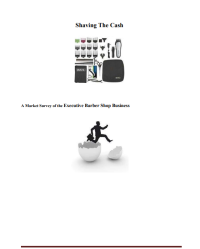
GUIDE TO START A BARBERSHOP BUSINESS IN KENYA
The executive barbershop business idea is an ideal option for anyone who wishes to widen their fishing net. And you don’t have to be a trained barber to start one. You can simply use your entrepreneurial prowess to start, then train a few young men from your area and recruit them to work for you. That way you’ll not only have established a source of livelihood for yourself but also helped create employment for deserving young men and women.
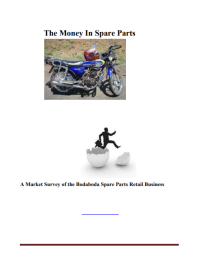
GUIDE TO START A MOTOCYCLES SPARE PARTS BUSINESS IN KENYA
Due to the flexibility of motorcycle (boda boda) transport, Kenyans opt to use motorcycles for short errands. This has led to an increase in the number of boda bodas in the country.
Consequently, these motorbikes need constant servicing and repair, hence the need for spare parts in most parts of the country. Venturing into motorcycle spare parts business is a great idea to fill the market gap. This is what you need to start a motorcycle spare parts business in Kenya.

GUIDE TO START CHIPS AND CHICKEN BUSINESS IN KENYA
Potato chips (fries) is a favorite meal for many people and especially women and children. This makes the chips business in Kenya a lucrative venture. The business is viable in most parts of the country, both rural and urban areas.

How to Start a Grocery Business in Kenya
By Tristram Ouma

Last updated on March 2nd, 2024 at 05:43 pm
Are you thinking about starting a grocery business in Kenya? With the rise in demand for convenient and affordable groceries, a grocery business has the potential to be highly profitable. You just need to have the right strategy and the right resources in place.
In this blog, we’ll explore what it takes to start a successful grocery business in Kenya. We’ll look at the key considerations when deciding if grocery business is right for you, how to get started, and how to make it profitable.
Is a grocery business profitable venture?
Yes, a grocery store owner can make around Ksh. 300k in 5-7 months . That makes it really profitable for those who want to get into this venture.
Here are some tips on starting a grocery business in Kenya
Also Checkout: How to Start an Ice Cream Business
Understand the Grocery Business
Before you jump into starting a grocery business, it’s important to understand the basics. Grocery stores offer products such as food, beverages, and household items, which are both necessities and luxuries.
The grocery business is competitive and highly regulated. You’ll need to research local laws and restrictions, as well as any potential competitors in the area. Additionally, you’ll need to consider how you’ll source and store your products.
Create a Plan
Once you’ve done your research, it’s time to create a business plan. This plan should include details such as your company goals, target market, product offerings, pricing strategy, marketing plan, and financial projections.
When it comes to financial projections, it is important to consider both start-up costs and ongoing costs. This will help you determine if the business is feasible and profitable.
Secure Financing
Once you’ve created your business plan, it’s time to secure financing. This is a critical step in starting a grocery business, as you’ll need capital to purchase inventory, pay for rent and utilities, hire employees, and more.
You may need to look into a variety of financing options, including traditional loans, grants, and equity investments. Make sure to consider both short- and long-term financing options.
Get the Right Suppliers
Before you can open your doors, you’ll need to secure suppliers. This includes finding vendors who can provide the right products at the right price. You’ll also want to look into options for shipping and delivery, as well as any special services you may need.
When looking for suppliers, make sure to research their reputation and reliability. You’ll want to make sure you’re getting the best quality products and services for your money.
Market Your Business
Once you’ve got everything in place, it’s time to start marketing your business. This can include traditional advertising, as well as online marketing tools such as search engine optimization and social media.
Make sure to focus on creating a strong brand identity, as well as strategies to attract and retain customers. Additionally, consider strategies for increasing sales and loyalty, such as loyalty programs and promotions.
Starting a grocery business can be a great way to build a successful and profitable business. If you take the time to plan and research, and make sure to market your business effectively, you can be well on your way to success.
How start omena business
Don't Miss
How can the kenyan government help smes, how to start a real estate business in uganda, how to start an electronics business in uganda, simple ways to increase fuliza limit, list of linda mama hospitals in marsabit county, list of linda mama hospitals in nairobi county, list of linda mama hospitals in nyamira county.

Grocery Business in Kenya: Full Guide
Blog Contents
Last Updated on: 7th November 2023, 12:34 pm
Have you ever wondered whether grocery business people make profits? Well, ‘mama mboga’ makes lots of profits, especially those in busy streets in any town in Kenya. You can also start a grocery business in Kenya and make profits.
In this guide, I will show you how to start a grocery business in Kenya—small or large scale, tips for success, and the challenges you may face. Grocery is among the businesses you can start with a capital of 1k or more, depending on your ability.
If you follow this guide keenly, you will get first-hand insights on how to start and succeed in the grocery business.
Remember to subscribe to my newsletter for exciting offers and freebies.
Keep reading.
Requirements To Start a Grocery Business in Kenya

Before you can start selling groceries in Kenya, you need to ensure you have the following:
1. Capital, starting from 1k to 50k or more
If you want to start a small-scale grocery business, you can start with as little as 1k. However, you need at least 50k to start a big-scale grocery business in Nairobi. But you can always start small and grow your stock levels as you move on.
2. A busy street to set up your grocery business
Before you can think of starting a grocery business in Kenya, ensure you research the best locations where you can set up your business. For instance, choose a location with residential estates and near roads.
3. A good supplier of the groceries you need
After your capital is ready, research the best sources to buy groceries at wholesale prices. In most Kenyan markets, there are grocery suppliers who supply on specific days. If you can easily access grocery farms nearby, you can buy them from the farm.
4. A business permit
If you need to start a large-scale grocery business in Kenya, you need a business permit licence from the county offices. You can pay as little as Ksh.3000, depending on your county government.
Small-scale mama mbogas do not pay for business permits in some counties, while others pay as little as Ksh.1000, depending on the county government.
5. A health licence
You should have a health licence for your grocery business in Kenya. In most counties, you will pay at least Ksh.1000 for a health licence.
To start a small-scale grocery business in Nairobi or any other part of the country, you need a wooden or metallic stall to display your groceries. I recommend you start with a wooden stall as it’s cheaper than metal. To start a large-scale grocery business, you need to rent a shop in a busy location.
What To Stock in Your Grocery Business in Kenya
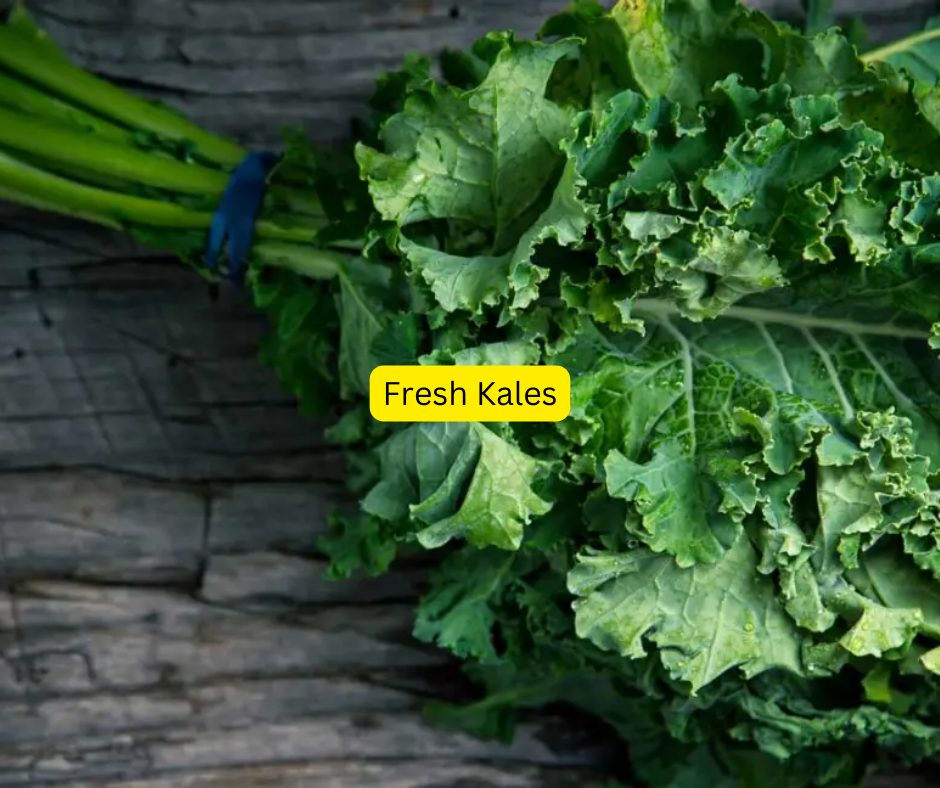
You can be worried about what to stock and what not to stock in your grocery store in Kenya. The following list should help you start a grocery business in your preferred location.
- Sukuma wiki
- Fruits
You can add more spices such as pilau masala, tea masala, ground ginger, ground saumu, etc.
How To Start a Grocery Business in Kenya With 1k

To start a small-scale grocery business with 1k, you should find an excellent location to set up your business. You can ask the available mama mbogas to help you find a space for your business.
Start with little cabbages, sukuma wiki, tomatoes, onions, and potatoes. You should also take a small basin, knife, and bucket from your house to wash the vegetables before cutting them.
Depending on the season, cabbages can cost between Ksh 20 and 80. You can slice them to get maximum profits. Sukuma wiki lasts around Ksh.20 to Ksh.30 per kilogram, depending on location. You can start with as much as 5kgs.
Tomatoes usually range between Ksh. 30 and Ksh.50 per kg, and you can buy two or three kilograms. Onions range between Ksh.80 and Ksh 150 per kg, so you can start with one or two kgs.
You can use the balance to buy packing bags, two sacks, and an authorised nylon paper to display your vegetables.
Always ensure you buy little stock for the most perishable vegetables. Purchasing small amounts of perishable vegetables will spare you losses if they go bad. However, as you stabilise the business, you can add more stock of the fast-moving goods.
How To Start a Grocery Business in Kenya With 50k or More
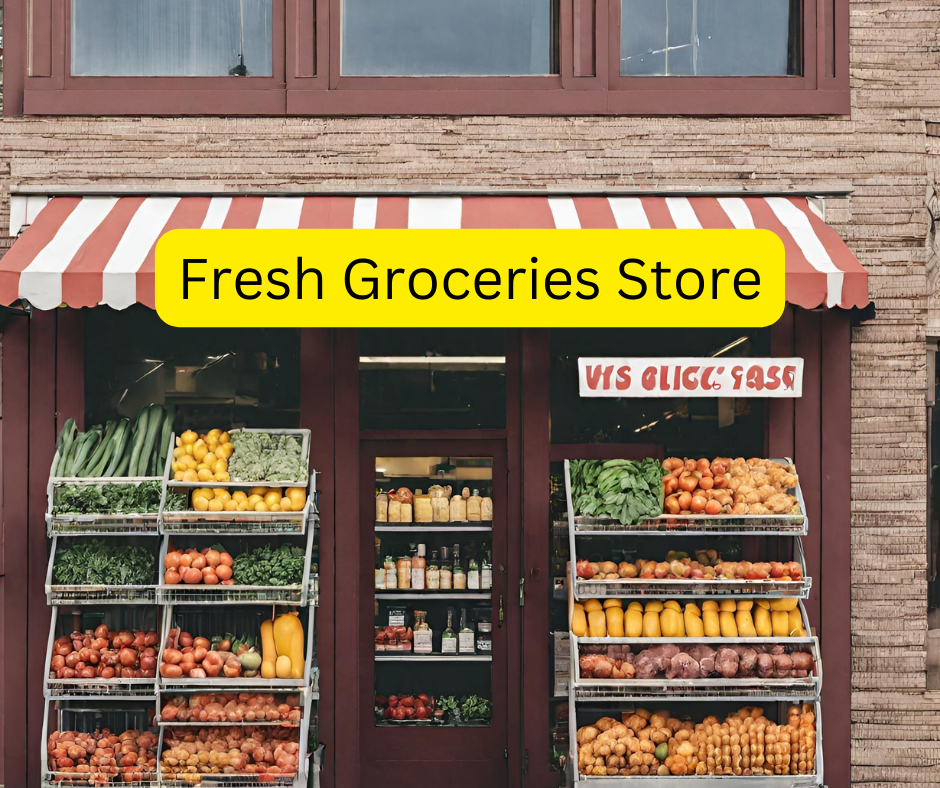
If you want to start a large-scale grocery business in Kenya, you need 50k or more to set up your business.
You need to rent a shop in a busy location. You can rent starting from Ksh. 5k to 10k, depending on your location. The less the rent, the better. You need to reduce expenses to maximise the potential profits.
After you’ve got a shop, you should spend around 10k to set up display shelves. Again, ensure you minimise expenses for setting up the shelves. You can continually advance later after the business stabilises.
You should now start stocking your grocery store. Ensure you balance the stocking of highly perishable groceries such as tomatoes, sukuma wiki, etc. For the less perishable items such as onions and potatoes, you can stock more.
You can also do proper branding for your grocery store in Kenya. Get a professional painter to brand your shop to your desired name and colours. Depending on your location and design requirements, you can spend between Ksh. 1000 and Ksh. 3000.
After you’ve set up your shop, go to county and health offices and let the officials assess your business. Afterwards, pay for a business permit and health licence to avoid disruptions during business hours.
Tips For Success in Grocery Business in Kenya
1. have a business plan..
Before you start selling groceries in Kenya, ensure you draft a business plan to ensure you have everything you need. You can do it yourself or hire a professional to help you craft a business plan for your business.
2. Choose a busy location.
People will always consume groceries. However, they would prefer to get to the grocery shops near them. Therefore, set up your grocery store in residential estates. The more quickly your shop is accessible, the more you will have customers.
3. Keep records
Do you know that 16% of businesses fail because they lack a proper business model, such as record keeping? You can avoid falling into that category by keeping clear records of purchases, sales, and expenses.
4. Save to buy a fridge
If you stay in the grocery business, you should aim to buy a fridge to store highly perishable fruits and vegetables. A refrigerator can help you avoid losses if the groceries do not deplete in three to four days. In addition, a fridge will help you stock more, and you will always have stock to sell. This idea will help you gain more customers since most customers like to shop where they get everything they need.
5. Stock the first moving groceries.
As you thrive in the grocery business, you should monitor the flow of different products. After you’ve known what moves fast and what doesn’t, you should focus on the first moving products to see fast returns.
6. Market your business.
Shop branding is great, but it would also help if you market your grocery store on social media to the right audience. For instance, if you operate a large-scale grocery store, your marketing efforts can lead to an increased customer base from the neighbouring towns. In addition, marketing can also help you get offers from small-scale to large-scale farmers willing to sell to you.
Challenges Facing Grocery Businesses in Kenya
Starting a grocery store doesn’t mean you will not face any challenges when running your business. However, with a positive mindset, you can overcome the obstacles and thrive in the industry.
After meeting with more than 50 grocery store owners in Nairobi, I noted the following challenges they face.
- Perishability of the goods
Let’s agree that no matter how careful you are, you can also undergo losses due to the perishable groceries in your store. Most small and medium grocery stores in Kenya find it hard to invest in proper storage for their groceries.
- Change in seasons
As we all know, most groceries in Kenya are seasonal. For instance, sometimes, tomatoes will be scarce and other times, plenty. The uncertainty of the grocery seasons can affect the stocking of most grocery stores in Kenya.
- Less capital
We all know that money has been an issue in Kenya, especially now when the economy is so bad. Most businesses are facing challenges in expanding their businesses since most cash goes to maintaining their families. More than 50% of grocery store owners said that they depend on their store for their family’s upkeep, making it challenging to grow their businesses.
Most grocery store owners agreed that loans have made them stagnate in the growth of their business. Some of them took loans with high-interest rates, which made it tough to repay.
- Change in consumer behaviour
Due to the high living costs in Kenya, most people have opted to cut costs to survive in these tough times. Some consumers have created kitchen gardens to cut costs in groceries, which is affecting the grocery business in Kenya.
With a positive mindset, you can start and succeed in the grocery business in Kenya. All you need is to get the right location, capital, and a good source for groceries at minimal costs. In addition, you need to actively manage your grocery business in Kenya to see better results.
Subscribe to my newsletter for more tips to start and grow different businesses in Kenya. In addition, you also get free tips to make money online and offline.
Leave a Comment Cancel reply
Save my name, email, and website in this browser for the next time I comment.
Yes, add me to your mailing list
Need a business plan? Call now:
Talk to our experts:
- Business Plan for Investors
- Bank/SBA Business Plan
- Operational/Strategic Planning
- L1 Visa Business Plan
- E1 Treaty Trader Visa Business Plan
- E2 Treaty Investor Visa Business Plan
- EB1 Business Plan
- EB2 Visa Business Plan
- EB5 Business Plan
- Innovator Founder Visa Business Plan
- UK Start-Up Visa Business Plan
- UK Expansion Worker Visa Business Plan
- Manitoba MPNP Visa Business Plan
- Start-Up Visa Business Plan
- Nova Scotia NSNP Visa Business Plan
- British Columbia BC PNP Visa Business Plan
- Self-Employed Visa Business Plan
- OINP Entrepreneur Stream Business Plan
- LMIA Owner Operator Business Plan
- ICT Work Permit Business Plan
- LMIA Mobility Program – C11 Entrepreneur Business Plan
- USMCA (ex-NAFTA) Business Plan
- Franchise Business Planning
- Landlord Business Plan
- Nonprofit Start-Up Business Plan
- USDA Business Plan
- Cannabis business plan
- eCommerce business plan
- Online Boutique Business Plan
- Mobile Application Business Plan
- Daycare business plan
- Restaurant business plan
- Food Delivery Business Plan
- Real Estate Business Plan
- Business Continuity Plan
- Buy Side Due Diligence Services
- ICO whitepaper
- ICO consulting services
- Confidential Information Memorandum
- Private Placement Memorandum
- Feasibility study
- Fractional CFO
- How it works
- Business Plan Examples
Supermarket Business Plan
Published Mar.17, 2023
Updated Apr.24, 2024
By: Jakub Babkins
Average rating 4.2 / 5. Vote count: 5
No votes so far! Be the first to rate this post.
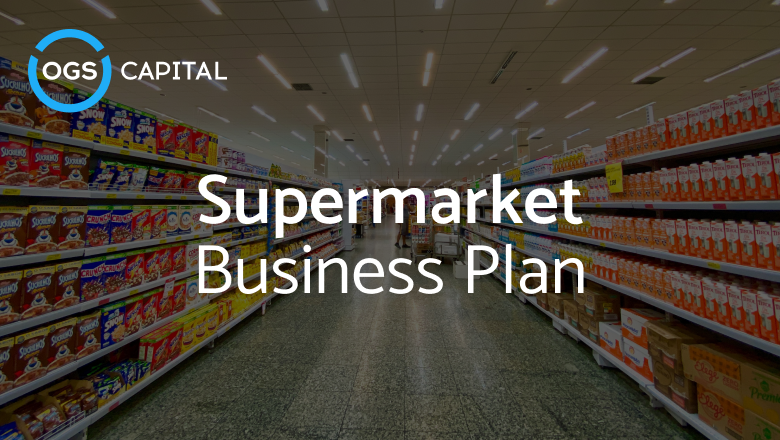
Table of Content
1. Supermarket Business Plan Template and Sample
This business plan to open a supermarket will help you create a comprehensive business plan for your supermarket. This plan will help you outline your marketing strategy, financial projections, operations, and personnel plans.
Your marketing strategy should include a detailed description of your target market and the methods you plan to use to reach and retain customers. Your financial projections should include a detailed breakdown of your projected expenses, net income, and cash flow. Your operations plan should outline your strategies for stocking the store, implementing customer service and loyalty programs, and managing the store’s day-to-day operations.
The plan can be used as a Farmers Market Business Plan or for any other business.
2. Executive Summary
Business overview.
Bella Supermarket is a full-service grocery store that offers a variety of fresh and organic products to the local community. The grocery supermarket store will provide a wide selection of grocery items, fresh produce, dairy, frozen items, and specialty items. Bella Supermarket will also offer an online ordering and delivery service for customers who prefer to shop from the comfort of their homes.
The store will feature a full-service deli and bakery and a prepared foods section with a variety of ready-to-eat meals like a Wholesaling Business Plan . Bella Supermarket will also feature a section dedicated to natural and organic products to meet the growing demand for healthier food options.
Bella Supermarket will be located in a highly visible location with ample parking and easy access from the highway. The store will be open seven days a week and offer competitive prices to attract customers. Bella Supermarket will also offer a loyalty program to reward frequent shoppers.
Bella Supermarket will focus on providing excellent customer service and a friendly shopping environment. The store will be staffed with knowledgeable employees who can help customers find their desired products. The store will also have an in-house nutritionist who can provide advice and guidance on healthy eating.
Bella Supermarket is committed to giving back to the community and will actively participate in local events and organizations. The store will also make an effort to source local products whenever possible.
Introducing Bella Supermarket, a full-service grocery store specializing in fresh, healthy, and affordable food products. Our selection of products includes
- Dairy products
- Frozen foods
- Fruits and vegetables
- Snacks and beverages
- Household and health care items
- Organic and natural foods
- Prepared meals
- Bakery products
- Non-food items (cleaning supplies, pet supplies, etc.)
Customer Focus
Our main customer focus is the families in our local area who are looking for an alternative to traditional grocery stores. In the Retail Discount Store Business , we will provide fresh, organic, and locally sourced produce, ethically sourced meats, and a wide selection of specialty items that cater to our target customer base. We will also provide a welcoming and comfortable shopping experience, with friendly customer service and knowledgeable staff, to ensure that customers have a pleasant and enjoyable shopping experience.
Management Team
Our management team consists of experienced professionals in the retail supermarket industry with expertise in marketing, finance, operations, and customer service. Our team is committed to delivering a superior customer experience and will ensure that our store is well-stocked, clean, and inviting. Our team will also work closely with local farmers and suppliers to ensure that our store has the freshest and highest quality produce, meats, and specialty items available.
Success Factors
We will be successful if we can build a loyal customer base by providing an exceptional shopping experience, offering quality products at competitive prices, and providing excellent customer service. Similar to the Old Style Corner Store Business Plan , we will also need to ensure that we stay up to date with industry trends and changes and remain competitive within the local market. Additionally, we will need to build strong relationships with our neighborhood supermarkets, local farmers, and suppliers to ensure that our store has the best selection of fresh and organic produce and meats, as well as specialty items.
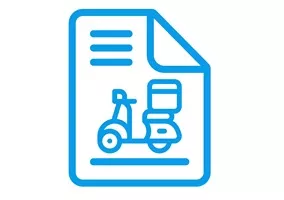
Financial Highlights
The financial highlights of this supermarket’s business plan provide an overview of the expected financial performance of this supermarket. The plan projects a net income of $1.1 million for the first year, with a projected growth rate of 10% for the following years. The plan also projects a gross margin of 30% and a net profit margin of 5%. Additionally, the plan estimates total operating expenses of $750,000 for the first year.
- Net Income: $1.1 million (first year) with a 10% growth rate for subsequent years
- Gross Margin: 30%
- Net Profit Margin: 5%
- Operating Expenses: $750,000 (first year)
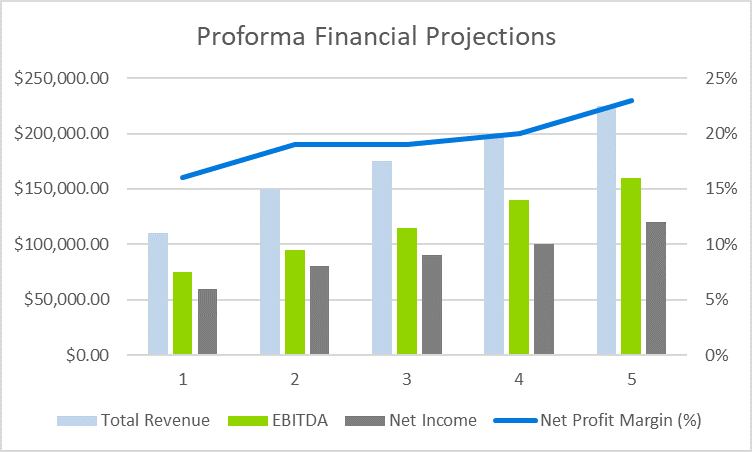
3. Company Overview
Who is bella supermarket.
Bella Supermarket is a family-owned and operated grocery store in the Texas area. Our goal is to provide the local community with a convenient and affordable shopping experience. We are committed to providing quality products and excellent customer service.
Our store will provide a variety of products, including fresh produce, meat and poultry, dairy, frozen foods, canned goods, health and beauty products, and other grocery items. We also plan to offer a variety of specialty items, such as organic and natural foods, gourmet cheeses, and international items. We will also offer a wide selection of prepared foods, such as sandwiches, salads, and prepared meals.
At Bella Supermarket, we are dedicated to providing a pleasant shopping experience. Our friendly and knowledgeable staff will be available to assist customers with their shopping needs. We will also offer delivery services for those customers who are unable to shop in person.
We will strive to offer competitive pricing on all of our products. We will also work closely with local farmers and producers to ensure that our customers are receiving the freshest and highest-quality products available.
At Bella Supermarket, we value our customers and will strive to provide a pleasant shopping experience. We look forward to serving the Texas community and participating actively in the local economy.
Bella Supermarket History
Bella Supermarket has been a family-owned and operated business since its inception in 1989. The founders, Jack and Maria Bello, opened the original store in San Antonio, Texas. Since then, Bella Supermarket has expanded to over twenty stores throughout Texas.
The mission of Bella Supermarket is to provide a convenient and affordable shopping experience with excellent customer service. Bella Supermarket has invested in modern technology, such as self-checkout kiosks, online ordering, and digital payment systems to achieve this. They also offer weekly specials and discounts to help shoppers save money.
Bella Supermarket strives to be an active community member, reaching out to local schools and charities. They host weekly events such as kids’ cooking classes and nutrition seminars to educate customers about healthy eating habits.
Bella Supermarket has also taken steps towards environmental sustainability by reducing its plastic bag usage and utilizing energy-efficient lighting systems. In addition, the company works with local farmers and businesses to provide fresh and organic produce.
Bella Supermarket is a great place to shop for value-conscious shoppers who want quality groceries at a great price. Their commitment to customer service and environmental sustainability makes them an ideal business partner for any community. With its state-of-the-art technology, extensive selection, and commitment to quality, Bella Supermarket should be the go-to choice for any grocery needs.
4. Industry Analysis
Supermarkets are an integral part of the retail industry in the United States. Supermarkets offer customers a wide selection of grocery and other products, including fresh produce, dairy, frozen foods, health and beauty products, household items, and more. The supermarket industry has seen steady growth over the past five years and is projected to grow at a rate of 3.5% per year over the next five years. This growth is driven primarily by an increase in the number of households, as well as an increase in disposable income.
Texas is the second-largest state in the US, with a population of 29.7 million. Dallas, Houston, and San Antonio are the three largest cities in the state. Dallas has the highest concentration of supermarkets in the state, with over 5,000 locations. Houston and San Antonio have over 3,000 and 2,000 supermarkets, respectively. The majority of supermarkets in Texas are independently owned and operated, though a few are part of large chains.
The supermarket industry is highly competitive, with large chains such as Kroger, Walmart, Safeway, and more vying for shoppers’ business. To remain competitive, supermarkets must offer various products at competitive prices. The industry is also highly regulated, with food safety standards, zoning regulations, and other restrictions that must be followed to remain in business.
The supermarket industry is highly fragmented, with large chains such as Kroger, Walmart, and Safeway accounting for the majority of the market share. Smaller regional chains, as well as independently owned and operated supermarkets, make up the rest of the market. The industry is highly competitive, and supermarkets must offer various products, competitive prices, and excellent customer service to remain competitive.
5. Customer Analysis
Demographic profile of target market.
To effectively market and develop a successful business plan for a supermarket in Texas, it is important to understand the customer base. Texas has an estimated population of 29.7 million people and is the second-largest state in the US. The state has an extremely diverse population, with a mix of rural and urban areas and many immigrants from Mexico and other countries.
The state is divided into four major regions: East Texas, Central Texas, North Texas, and South Texas. Each region has different characteristics, such as economic, political, and cultural. Understanding the different regions and their differences can help create a better business plan and marketing strategy.
The majority of the population in Texas is made up of White non-Hispanic individuals at 44%, followed closely by Hispanic individuals at 39%. African-Americans and Asian Americans make up around 14% and 3% of the population, respectively. The population’s median age is 33.7, with the largest age group being 25 to 34-year-olds, who make up 22% of the population. The median household income is $58,000, and the poverty rate is 16%.
Customer Segmentation
To effectively target the right customer base for a supermarket in Texas, it is important to segment the customer base into different demographic groups. The segments could include:
Young Families – This segment includes families with children under the age of 18. These families are typically looking for affordable, fresh food options and convenience.
Millennials – This segment includes individuals between the ages of 18 and 34. They are looking for convenience and healthy food options and are more price-conscious.
Seniors – This segment includes individuals over the age of 65. They are typically looking for convenience, fresh food options, and value.
6. Competitive Analysis
The supermarket business is a highly competitive industry, with numerous large operators vying for market share. This business plan section examines the current competitive landscape and identifies the strengths and weaknesses of both direct and indirect competitors.
Direct and Indirect Competitors
Direct Competitors
Supermarkets in the local area are direct competitors in the supermarket business. Walmart, Kroger, Safeway, Target, and other regional grocery store chains fall into this category. In addition to grocery items, prepared foods, household items, and other convenience items, these competitors offer similar products and services. These competitors also offer competitive pricing and may also offer discounts and other promotions to attract customers.
- Well-established relationships with suppliers, allowing them to offer competitive prices.
- Brand recognition and loyalty among customers.
- Expertise in the industry and a wide selection of products.
Weaknesses:
- High overhead costs associated with operating multiple stores.
- Limited marketing budgets, leading to inadequate customer awareness.
- Lack of flexibility in responding to changes in the market.
Indirect Competitors
The indirect competitors in the supermarket business are non-traditional grocery stores. These include convenience, discount, drug, and online grocery stores. These competitors offer similar products and services but may not offer the same level of convenience, selection, and pricing as a traditional supermarket. These competitors may also offer additional services such as pharmacy, banking, and other services. Additionally, these competitors may offer discounts and other promotions, such as loyalty programs and discounts for frequent shoppers.
- Lower overhead costs associated with limited store locations.
- Ability to offer competitive prices due to lower overhead costs.
- Innovation and flexibility in responding to changing market trends.
- Limited brand recognition and customer loyalty.
- Lack of expertise in certain areas of the business.
- Inadequate marketing budgets, leading to limited customer awareness.
Competitive Advantage
Supermarkets have several competitive advantages over their competitors. Supermarkets offer a wide selection of items and competitive pricing. They also offer convenience to their customers, as they are often located close to the customer’s home. Supermarkets also have the ability to offer loyalty programs and special promotions to their customers. Additionally, supermarkets often have well-trained staff to help customers find the necessary items. Finally, supermarkets can often provide customers with a more personalized shopping experience.
7. Marketing Plan
Excellent work.
excellent work, competent advice. Alex is very friendly, great communication. 100% I recommend CGS capital. Thank you so much for your hard work!
The marketing plan for starting the supermarket business will focus on targeting customers in our local area. We will use traditional and digital marketing methods to reach our target market.
Traditional marketing methods will include print and broadcast advertising, direct mail campaigns, and promotional events. Our print and broadcast campaigns will focus on highlighting the unique features and benefits of our supermarket, such as our wide selection of fresh produce, organic and gluten-free options, and competitive prices. Our direct mail campaigns will target local households and offer special discounts and promotions. Finally, we will host promotional events at local parks and other public spaces to attract new customers and help build brand awareness.
Our digital marketing plan will use social media platforms, our website, and search engine optimization (SEO) to reach our target audience. Our social supermarket campaigns will highlight our products and services while engaging our followers with interesting content related to food and nutrition. Our online supermarket business plan’s website will feature our products, services, and promotions and allow customers to order online. Finally, our SEO efforts will optimize our website for local search terms, such as “supermarket near me,” to ensure we are visible in local search results.
Our direct competitors will be other local supermarkets offering similar products and services. These competitors will likely have similar price points, promotions, and customer service.
Our indirect competitors will be other retailers that offer some of the same products and services as our supermarket, such as convenience stores, health food stores, and online grocery delivery services. These competitors may offer some of the same products as us at lower prices or may offer convenience and other services we cannot.
Promotions Strategy
The business will utilize various promotional tactics to create awareness and draw customers to the store. The primary tactics will include:
- Social media: The business will use social media platforms like Facebook, Twitter, Instagram, and YouTube to reach potential customers. The business can create brand awareness by posting engaging and informative content about the business, products, and services.
- Email marketing: The business will create an email database of customers and send them weekly emails to inform them of new products, promotions, and offers.
- Advertising: The business will advertise in local newspapers and radio stations to create awareness and draw customers to the store.
- Promotional events: The business will host promotional events such as cooking demonstrations and tastings to draw customers to the store.
- Loyalty program: The business will implement a loyalty program to reward customers for their loyalty and encourage repeat purchases.
Our pricing strategy will focus on providing competitive prices that reflect the quality of our products and services. We will also focus on providing value to our customers by offering discounts and other promotions. We will monitor our competitors’ prices to ensure our prices remain competitive.
8. Operations Plan
Operation functions.
- Store Management: This will include the day-to-day operations of the store, such as stocking shelves, managing customer service, and overseeing cash register transactions.
- Inventory Management: This will involve managing orders, tracking stock levels, and replenishing items as needed.
- Financial Management: This will include creating and managing budgets, tracking expenses, and creating financial reports.
- Marketing: This will involve creating and executing marketing plans, developing promotional campaigns, and analyzing customer data.
- Human Resources: This will involve recruiting, hiring, and training new staff; managing employee payroll; and ensuring compliance with labor laws.
5/15/202X – Develop Business Plan
5/22/202X – Research Potential Locations
6/1/202X – Secure Financing
6/8/202X – Hire Staff
6/15/202X Order Supplies
6/22/202X – Set Up Shop
7/1/202X – Promote Business
7/8/202X – Launch Grand Opening
7/15/202X – Monitor Performance
7/22/202X – Adjust Strategies
9. Management Team
The chief executive officer (CEO) will lead the business strategy, create the vision, and oversee the day-to-day operations. The CEO will be responsible for making sure that the business meets its objectives and meets customer satisfaction.
Company Staff
Company staff should include a team of experienced and knowledgeable personnel in order to ensure that the business runs smoothly and efficiently. This team should include
- Manager/Operations
- Assistant manager
- Store clerks
- Receptionist
- Security Personnel
10. Financial Plan
We are seeking funding of $2 million to cover the costs of setting up and running our supermarket business. This funding will cover the supermarket’s startup and operational costs.
Key Revenue & Costs
Key Revenue
The main source of revenue for the mini supermarket business plan is sales of grocery items and other related products, such as prepared foods, beverages, and other convenience items. Sales of prepared foods and beverages are expected to account for approximately 40% of total revenue, while grocery items will make up the remaining 60%.
The key costs associated with the Supermarket Business Plan include the following:
- Personnel costs (including wages, benefits, and taxes): 25%
- Rent, utilities, and other overhead costs: Approximately 10%
- Cost of goods (including food, beverages, and other products): 50%
- Marketing and advertising costs: 5%
- Miscellaneous costs (including insurance, maintenance, and licensing fees): 10%
Funding Requirements and Use of Funds
Funding Requirements
- Working capital – $200,000
- Expansion capital – $3 million
- Total Funding Requirements – $3.2 million
Use of Funds
- Construction – $1.5 million
- Equipment and Supplies – $700,000
- Inventory – $500,000
- Pre-opening Expenses – $200,000
- Working Capital – $200,000
Key Assumptions
These assumptions are essential for obtaining the company loan and estimating income and costs for the financials.
The supermarket will generate $1,200,000 in annual revenue.
The supermarket will have an average gross margin of 25%.
The supermarket will have an average markup of 25%.
The supermarket will employ 15 full-time employees.
The supermarket will have a start-up cost of $500,000.
The supermarket will have a monthly income of $100,000.
The supermarket will have an average inventory turnover of 8.
The supermarket will offer a variety of products and services.
The supermarket will have a customer base of 500 people.
The supermarket will have an average customer satisfaction rating of 8/10.
Financial Projections
All tables in PDF
- What is a supermarket business plan? A supermarket business plan is a document that outlines the strategy and goals of a supermarket business. It includes the goals and objectives, market analysis, marketing strategies, financial projections, organizational structure, and other important details. The plan should be comprehensive and provide an overall picture of the business, its operations, and its potential for success.
- What are the main types of supermarkets? Supermarkets are an important part of modern life, providing convenience and variety for shoppers. Several types of supermarkets are available today, each offering different services and products. The most common type of supermarket is the traditional grocery store, which offers many food items, including fresh produce and packaged goods. These stores also often have a selection of household and personal care items and health and beauty products. Another popular type of supermarket is the discount store, which offers various products at discounted prices. These stores typically have a smaller selection than traditional grocery stores but can be a great option for shoppers looking for bargains. Organic supermarkets are also growing in popularity, offering a selection of organic and natural foods. These stores often provide product information and have knowledgeable staff to help customers make informed decisions.
- What are the main sources of revenues and expenses for a supermarket? The main sources of revenue for a supermarket include the sales of food, beverages, and other merchandise, as well as services such as deli counters and bakery items. Expenses for a supermarket include the costs of purchasing inventory, labor, rent, utilities, marketing, and other overhead. Additionally, supermarkets must account for the costs of managing their supply chain, such as shipping and warehousing products.
- How do you get funding for your supermarket business plan? There are several ways to secure funding for a supermarket business plan. One of the most common methods is to seek out investors who are willing to provide capital. This can include both individuals and companies. It is important to clearly outline the potential return on investment for potential investors to attract their interest. Additionally, obtaining funding through loans from banks or other financial institutions may be possible. It is important to have a well-crafted business plan that demonstrates a viable path to profitability. Finally, government grants may be available in some cases, and they should be explored as a potential funding source.
Download Supermarket Business Plan in PDF
OGSCapital’s team has assisted thousands of entrepreneurs with top-rate business plan development, consultancy and analysis. They’ve helped thousands of SME owners secure more than $1.5 billion in funding, and they can do the same for you.

One thought on “ Supermarket Business Plan ”
I liked this doument
Ice Vending Machine Business Plan

OGScapital at the National Citizenship and Immigration Conference

How to Start a Plumbing Business in 2024: A Detailed Guide

Vegetable Farming Business Plan

Trading Business Plan

How To Write A Textile Manufacturing Business Plan

Any questions? Get in Touch!
We have been mentioned in the press:
Leave a Reply Cancel reply
Your email address will not be published. Required fields are marked *
Save my name, email, and website in this browser for the next time I comment.
Search the site:
- Restaurant/Hotel/Bar Software
- Supermarket Software
- Wine and Spirits Software
- Cosmetics and Beauty Store Software
- Electronics Shop, Computer Shop, Mobile Phones Shop Software
- Agrovet POS System in Kenya
- Hardware POS System in Kenya
- General Retail Software
- SimbaPOS Mobile Reports App
- Business CCTV Installers in Kenya
- Home Residential CCTV Installers in Kenya
- Access Control Systems in Kenya
- Time & Attendance systems in Kenya
- Retail Point of Sale POS System in Mombasa
- Boutique and Clothing Store Software in Mombasa
- Restaurant and Bar POS System in Mombasa
Starting a Grocery Store Business in Kenya
- October 12, 2021
- Posted by: simba001
- Category: Business Insights
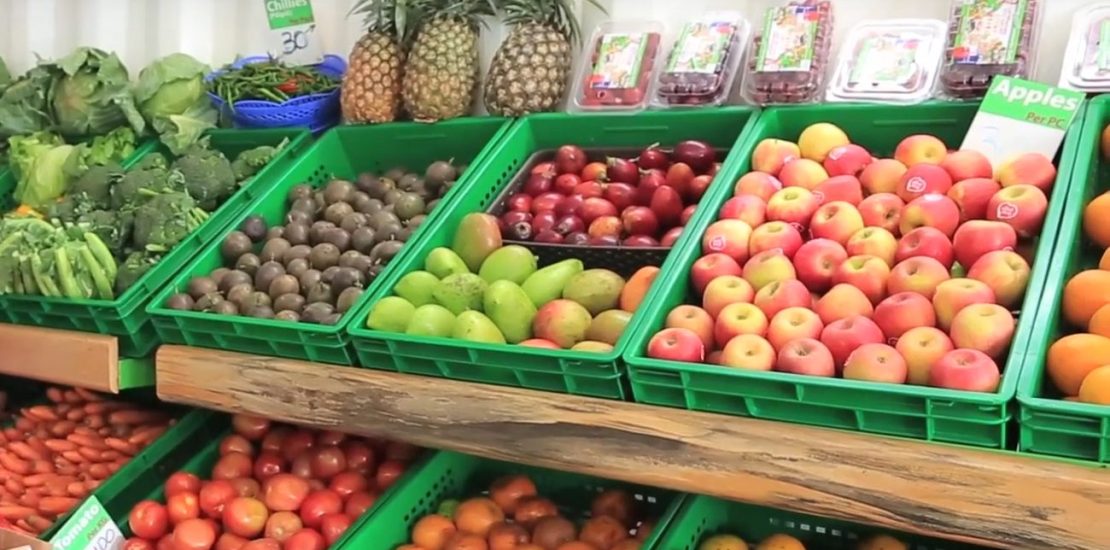
A grocery store business in Kenya is a profitable business especially if you find a business location in a busy and highly populated area. To make it in the business, you need to make sure that your grocery is clean, organized and that you sell fresh produce. In a busy area, you can be making at least Ksh 1,000 daily from your grocery store.
Human beings must consume food and groceries irrespective of prevailing cicurmstances. This is one good reason why putting up a small grocery store business is one of the best businesses you can have if you are looking for a small-capital business.
In order to start a grocery store business in Kenya, below are some of the key things to consider:
Get a Suitable Business Location
You need to identify a suitable business location for your grocery store. Look for a place with high human traffic like at the roadside or a marketplace. You can also set up one near a residential area if you identify an opportunity.
You need to have a good display where you can be organizing your vegetables. Also, make sure your grocery store is visible from a far distance.
Identify Reliable Suppliers
Grocery stores in Kenya mostly deal with highly perishable items. This means that as a grocery store owner, you have to ensure that you have reliable suppliers from whom you can source quality products. It is also important that the grocery items are delivered quickly to the grocery store and stored well.
The quantity of grocery items to be stocked at any time must be well planned – to avoid overstocking or understocking. To this end, it’s advisable that you have good suppliers who can supply the required items even on short notice.
Acquire Necessary Business Permits
You need to ensure that your grocery business is licensed by the authorities. Otherwise, you will be in constant conflict with them. You need the following business licenses to operate a green grocery business in Kenya.
- A Single Business Permit. You can get this permit from the City council. It usually costs around Ksh 5,000, but this depends on the size of your business.
- A Food Safety Certificate. This is issued once it is certified that the food you are selling to customers is safe for consumption. Your business premises will be inspected before you are issued with this certificate.
Branding, Marketing and Customer Relationships
The business environment is very competitive and therefore you have to rise above the competition. Suffice to say, there are many existing grocery stores in every place – from small mama mbogas to high end grocery stores in shopping malls.
Fo you to succeed, it’s important that you brand your grocery store well in order to atract customers. Marketing is also critical so that the potetntial customers in your catchment area can know that your business exists. You can do digital/online marketing or distribute flyers. Finally, you have to maintain exceptionally good relationship with your customers so that they can give you repeat business.
Cost of Starting a Grocery Store Business in Kenya
The cost of starting a grocery store depends on the size of your business and its location. For instance, it is expensive to start one in a city like Nairobi compared to another small town like Ruiru.
But generally, to start a small grocery, you need around Ksh 50,000 while a medium grocery requires at least Ksh 100,000. The following is the startup capital breakdown for a small grocery store:
- Rent – Ksh 10,000
- Stock – Ksh 50,000
- Business permit – Ksh 5,000
- Grocery display – Ksh 10,000
- Branding – Ksh 10,000
A grocery shop business is good and profitable in Kenya regardless of your location. And you don’t need too much capital to start. You can start small and grow as time goes by.
Remember to prioritize your customer and give them the best customer service and fresh products. This way, you will grow your customer base and even expand or open other branches with time.
Related Posts

Contact us at the SimbaPOS office nearest to you or submit a business inquiry online.

Starting a Supermarket Business Plan (PDF)

Starting a supermarket business can be an incredibly rewarding venture, both financially and personally. A supermarket is a typically large store that sells a broad range of groceries and household goods. It is also commonplace for the range to span to medications, clothing, and other fast-moving consumer goods (FMCG). In the world of retail, supermarkets stand out as a beacon of profitability and stability, offering entrepreneurs a chance to tap into the evergreen demand for daily necessities. Unlike many other retail sectors that might fluctuate with trends and seasons, the supermarket business consistently attracts a wide range of customers, all looking for a convenient and comprehensive shopping experience. This sector is not only lucrative but also resilient, able to withstand economic shifts more robustly than many other industries.
The allure of the supermarket business lies in its impressive profits. With careful planning, strategic purchasing, and effective management, a supermarket can offer a diverse range of products while maintaining healthy margins. From fresh produce to household goods, supermarkets cater to every aspect of daily living, providing a one-stop solution for consumers. This variety not only increases the potential customer base but also enhances the opportunity for cross-selling and upselling, further boosting profitability. Moreover, the rise of private-label products has given supermarket owners a new avenue to increase margins, offering quality goods at competitive prices. High demand is another cornerstone of the supermarket business’s appeal. In today’s fast-paced world, consumers value convenience and variety more than ever. Supermarkets meet these needs by offering a vast array of products under one roof, saving customers time and effort. This convenience, coupled with the essential nature of many supermarket products, creates a steady stream of customers, ensuring a consistent demand. The global supermarket industry is currently valued at over US$3 trillion. By 2030, it is projected to be worth roughly US$15 trillion. It is no doubt a huge industry and has limitless business opportunities. This article will outline how to start a supermarket business, and the supermarket business plan – PDF, Word and Excel.
Market Research
Importance of market research.
You better not take this lightly because if you do you’ll pay dearly later when you start realising low customer inflows to your supermarket business. One of the foremost things to look at is competitors with respect to products they offer and their general appeal to the market. You market research must also focus on figuring out how you’ll make your entry into the market. During the market research processes closely study how established supermarket players market their businesses. Also take time to study their approaches and frameworks in pricing their products. The beauty of this is that you can do it clandestinely without your prospective competitors knowing what you’re up to. The crux of your market research is to figure out how you’ll brand and package your product portfolio in a way that distinguishes you from them. Supermarkets are generally plenty and customers are spoilt for choice thus the competition is fierce. So be thorough and diligent in conducting your market research.
Ecommerce – A Trend Worth Factoring In
There have been some noteworthy shifts in the supermarket business over the years you must consider. For instance, there has been a significant rise in ecommerce. This means you need to do a research into the demographic of online shoppers. Look into how that shift affects the traditional brick and mortar supermarket business approach. Probably you would have to find a way to blend both. These are some of the things your supermarket market research must seek to establish.
Conducting The Market Research
There are a number of options you can use in conducting market research for your supermarket business. It is wise to use more than one so as to have more comprehensive findings. The best market research methods you can use are surveys, observations, and interviews. Surveys enable you to get to know people’s opinions, attitudes, and pain points, amongst others. Observations are best for getting to appreciate people’s general customer experiences. Interviews are for engaging strategic interviewees e.g. consumers, current players, or business experts.
There are still many opportunities for small and medium-sized firms to specialise in the supermarket business. The reasons are mainly to do with the fact that the larger chains have lost the personality that was once associated with shopping. They are in effect a conveyor belt of consumer goods. Some people prefer a much more intimate relationship with their grocery store and that is why supermarkets remain one of the most popular business ideas for the budding entrepreneur. Read on for more information and the grocery store business plan.
Make sure you have a comprehensive supermarket business plan
The failure to plan is the beginning of business failure. The supermarket business plan must be clear and succinct enough to give your potential partners, clients and investors an overview of what your objectives are. At the same time, it must be detailed enough to explain the nuances of the business that you propose. Your grocery store business plan should have financial statements which show that your supermarket business is viable and profitable.
Location of the Supermarket Business
It goes without saying that a poorly located supermarket is the death of the business. Private cars have made it fashionable for people to get out of town in order to do their shopping. However, that is not an option that is suitable for everyone since there are still consumers who hanker for the personal touch. It is best to position your supermarket business as if it were a local community center. That means building relationships with the public within that target market. It also means ensuring that your customer care never falls below their exacting standards.
Some of the common broad categories of places where supermarkets can be setup are malls, shopping centres, central business district (CBD), residential areas and standalone places. Each category comes with its own set of advantages or disadvantages so it’s up to you. If you get your location right, then there is no reason why you cannot enjoy the significant revenue streams that a supermarket business is capable of bringing. People are now used to shopping at all hours. In particular, you should take note of the resilience of the basic household shopping basket which has remained dominant even during the worst phases of the recession. The supermarket business plan should cater for the costs of purchasing or leasing the premises at your chosen location.

Premises for the Grocery Store Business
The supermarket must be setup at a location connected to a strategic road network for easy accessibility. There must be ample space for vehicle parking and there must be a semblance of security. The supermarket itself must be sufficiently spacious for customers to move around freely inside.
On another note, it’s important to have backrooms or warehouses (for administration and keeping of stock or inventory) that are accessible from the back so as to not disrupt customers. Not all customers have vehicles and might want to buy bulky items. With respect to that it would be expedient to locate the supermarket close to mass transportation. The costs of leasing the premises should be included in the grocery store business plan.
Supermarket Business Model
A business model is the description of the means and methods a business adopts to earn its revenue. In other words, it is a description of how a business makes money. In order to be successful in your supermarket business you must understand the supermarket business model. A supermarket sources its products from suppliers. These suppliers are often manufacturers or wholesalers. The supermarket then places a mark-up on those products to come up with the retail prices. This sounds simple but there are delicate balances to be struck in all this.
A Delicate Balancing Act
When customers go to supermarkets they are usually looking to get stuff at the cheapest prices possible. No wonder they tend to do price comparisons. After all, there are usually many supermarkets to consider. This means supermarkets are generally under pressure to offer low prices. This is to both push volumes and to outdo their competitors.
On the other hand you have to factor in the many operating costs which tend to surge a lot. These are things such as human resources, transport and logistics, ICTs, and several others. The selling prices you set must cater for all these many elements. You also have to factor in things like inflation or mercurial exchange rates where applicable. That is why it may seem simple but a lot goes into streamlining the supermarket business model.
The Importance Of Economies Of Scale
Economies of scale refer to the characteristics of a production process in which an increase in the scale of a business causes a decrease in the long term average cost of each unit. Increase in capacity and a reduction in costs is basically what brings about economies of scale. The reason is because the costs get distributed or spread out due to an increase in goods. Thus the goal is to expand the size or scale of your supermarket over time. It is characteristic to see big supermarkets charging less than smaller supermarkets. Yet they will still be making profit. Plus they will be pushing more volumes than the smaller supermarkets due to lower prices. This is an important angle to the supermarket business model.
Product selection criteria
The product range is quite broad and diverse making room for you to choose what to offer in your supermarket. However, remember that the supermarkets domain is characterised by fierce competition. You wouldn’t want a scenario where customers actually get in-store but leave empty-handed because they wouldn’t have found what they want. Therefore it’s in the best interest of both you and customers to have a comprehensive range of products.
Products to include are basic food and non-food grocery items, household appliances and consumables, cooked food takeaways, bakery items , fresh produce, dairy products, clothing items, toys, beauty products, toiletries, school supplies, beverages and so on. It’s wise to constantly study customer behaviours and buying patterns in order to note any areas where you’re falling short of customer expectations. Explore ways to source stock at low prices so as to competitively price your products. The supermarket business plan should cater for the costs of purchasing the supermarket products.

Inventory Management
Inventory management is a cornerstone of success for any supermarket business. It involves the meticulous control and oversight of your stock levels, striking a delicate balance between having the right products available for customers and preventing excess inventory that can tie up valuable capital. To excel in this aspect, begin with demand forecasting, using historical sales data, market trends, and seasonal patterns to predict customer needs accurately. This practice ensures that your supermarket stocks products in quantities that align with customer demand, reducing the risk of overstocking or running out of essential items. Having a software-based system is essential, with an integrated and centralized structure being the optimal choice. This system should incorporate an electronic point of sale (EPOS) system that seamlessly connects to inventory management software, allowing for real-time updates of inventory levels. This integration ensures that you can efficiently and accurately monitor your stock levels at any given moment, providing you with the ability to make informed decisions about restocking, ordering, and managing inventory with precision.
Regular inventory audits, coupled with strong supplier relationships and technology adoption, enhance the efficiency of your inventory management efforts. Leveraging inventory management software and systems to automate processes reduces the risk of human error and streamlines inventory tracking. Implementing inventory costing methods like First-In, First-Out (FIFO) or Last-In, First-Out (LIFO) is vital, especially for perishable goods. Seasonal inventory planning allows for adjustments to accommodate fluctuations in demand, while evaluating vendor performance and tracking key performance indicators (KPIs) like inventory turnover rate and stockout rate provides valuable insights into the overall effectiveness of your inventory management strategy.
Competitive Analysis
When running a supermarket business you will contend with fierce competition. There will be both direct and indirect competitors; you must seek them out and study them. In principle, do a comprehensive analysis of each, especially the direct competitors. Check out their product offerings and overall business operations. Figure out what they are doing right and where they are missing it. Emulate and perfect the former and capitalize on the latter. There will always be something that you can take note of on every competitor.
Staff And Management for Supermarket Business
Giving you specific numbers might not be possible since human resource needs will depend largely on the size of your supermarket. However, there are key areas that’ll need to have people employed for them specifically. Some of the job posts needed are cashiers/till operators , security guards, general hands, customer attendants, amongst others. The employees you’ll need are a mixture of formally qualified and non-qualified personnel. On the management side some key service areas will be financial management, HR, operations, marketing and sales. In hiring employees be careful to ensure you hire people who are passionate about serving people whilst having a diligent work ethic. The grocery store business plan should cater for salaries and wages costs for your staff.
Budgeting and Financial Planning
Effective budgeting and financial planning are crucial components of launching and sustaining a successful supermarket business. Careful financial management ensures that you can meet your operational expenses, adapt to market changes, and achieve your long-term business goals.
Start-Up Costs & Operating Expenses
Before opening your supermarket, you’ll need to determine your initial start-up costs. This includes expenses like securing a location, store design and construction, purchasing equipment and shelving, obtaining permits and licenses, inventory acquisition, and hiring and training staff. A comprehensive understanding of these costs is essential for securing financing and ensuring you have the necessary capital to launch your business. Operating expenses are the ongoing costs required to run your supermarket. They include employee salaries, rent or mortgage payments, utilities, insurance, marketing, inventory purchases, and maintenance. Creating a detailed budget that accounts for these expenses on a monthly or yearly basis is essential for maintaining financial stability.
Revenue Projections & Cash Flow Management
Your revenue projections are based on your market research and pricing strategies. Estimate your sales based on factors such as customer volume, average transaction value, and seasonal variations. Realistic revenue projections are essential for tracking your progress and determining whether your supermarket is on track to meet its financial goals. Effective cash flow management is vital to ensure that your supermarket always has enough liquidity to cover expenses, especially during slower sales periods. Monitor your cash flow regularly and plan for contingencies to avoid potential cash shortages that could disrupt your operations.
Monitoring and Adjusting
Regularly monitor your budget and financial performance to ensure that you are staying on track. If you find that your actual expenses or revenues deviate significantly from your projections, be prepared to make adjustments to your budget and financial plan. Flexibility is key to adapting to changing market conditions and maintaining a healthy financial position. Market conditions can change, and unexpected challenges can arise. It’s crucial to have contingency plans in place to address potential financial setbacks, such as a sudden drop in sales, increased competition, or unexpected repair costs. A well-thought-out contingency plan can help safeguard the financial stability of your supermarket business.
Marketing Plan
There is no end to the strategies you can employ to market your supermarket business. Broadly, there are 3 core areas you must do something in namely, digital, offline, and in-store. Set up active social media accounts and make them highly interactive. Have an active website as well for your supermarket. Do not neglect putting up physical promotional material such as banners, billboards, or posters. Have such around your target market area and around your supermarket. Build in psychological hacks in-store. Place ads wherever you can e.g. radio, television, or podcasts. One of the cardinal marketing drivers in the supermarket business is encouraging word of mouth and referrals. This is achievable via alluring strategies such as customer loyalty programmes, promotions, competitions, and sponsoring worthy causes.
Watch the wastage and sabotage
It is impossible to operate a supermarket business single-handedly. You need a significant staff of tellers, cleaners, stackers, accountants, marketers and supervisors. That variety of personnel might mean that a lot of wastage occurs during the production or marketing process. There are far too many stories of supermarkets that would have been successful had it not been for a pilfering worker or infiltration. That means from time to time you need auditors who do not just consider what is involved in the marketing process or even the money but also the activities of workers. You will need to install an appropriate security system and update it on a regular basis. The security is not only for the merchandise that you are selling but also the workers that are in the store.

Growth and development
Supermarkets are rarely static. You will find new products and new clients. The key is not to take on any product or service that you are not fully prepared for. There are plenty of incentives to earn the loyalty of your customer. For example, store cards and bonus points will encourage consumers to come to your supermarket business. On the other end of the spectrum are the small shops in small towns where the use of cash is preferred to anything fancy like credit cards. Be sure to develop partnerships with particular brands who may want to sell their products on your shelves. The profit share schemes that they propose could significantly improve the supermarket’s bottom line. Your supermarket business plan financials should show the projected growth of the business as the years progress.
Keys To Profitability
Achieving and sustaining profitability in your supermarket business hinges on a combination of strategic decisions and effective management practices. Firstly, efficient inventory management is paramount. It involves finding the right balance between stocking products to meet customer demand and avoiding overstocking that ties up capital. Coupled with this is the implementation of pricing strategies that maximize profit margins while remaining competitive in your market. Regularly reviewing and adjusting your pricing based on market trends, competition, and customer preferences is essential for success. Additionally, the careful selection of products and merchandise, tailored to the preferences and needs of your target customers, is crucial. Highlighting high-margin items and promoting them through effective merchandising techniques can boost sales. Providing an exceptional customer experience through friendly and knowledgeable staff, an organized store layout, and efficient checkout processes is essential for customer satisfaction, ultimately leading to increased loyalty and repeat business.
Cost control measures, including vigilant monitoring of operating expenses and negotiation with suppliers for favorable terms, play a significant role in profitability. Effective marketing and promotional activities, both online and offline, are essential for attracting and retaining customers, with loyalty programs and incentives encouraging repeat business. Strong supplier relationships can lead to better pricing, credit terms, and access to exclusive products, while data analytics provide insights into customer behavior and inventory turnover, enabling data-driven decision-making. Moreover, financial monitoring through regular financial statements and reports is vital, as it helps identify areas for improvement. Remaining adaptable and open to innovation in the ever-evolving retail landscape is key, as is investing in employee training and productivity to enhance efficiency and customer service.
Pre-Written Supermarket Business Plan (PDF, Word And Excel): Comprehensive Version, Short Funding/Bank Loan Version and Automated Financial Statements
For an in-depth analysis of the supermarket business, we encourage you to purchase our well-researched and comprehensive supermarket business plan. We introduced the business plans after discovering that many were venturing into the grocery store business without enough knowledge and understanding of how to run the business, lack of understanding of the financial side of the business, lack of understanding of : the industry, the risks involved , costs and profitability of the business; which often leads to disastrous losses.
The StartupBiz Global grocery shop business plan will make it easier for you to launch and run your grocery store business successfully, fully knowing what you are going into, and what’s needed to succeed in the business. It will be easier to plan and budget as you will be aware of all the costs involved in setting up and running the supermarket business.
Uses of the Grocery Store Business Plan (PDF, Word And Excel)
The supermarket business plan can be used for many purposes including:
- Raising capital from investors/friends/relatives
- Applying for a bank loan
- Start-up guide to launch your supermarket business
- As a supermarket business proposal
- Assessing profitability of the supermarket business
- Finding a business partner
- Assessing the initial start-up costs so that you know how much to save
- Manual for current business owners to help in business and strategy formulation
Contents of the Supermarket Business Plan (PDF, Word And Excel)
The supermarket business plan include, but not limited to:
- Marketing Strategy
- Financial Statements (monthly cash flow projections, income statements, cash flow statements, balance sheets, break even analysis, payback period analysis, start-up costs, financial graphs, revenue and expenses, Bank Loan Amortization)
- Industry Analysis
- Market Analysis
- Risk Analysis
- SWOT & PEST Analysis
- Operational Requirements
- Operational Strategy
- Why some people in the supermarket business fail, so that you can avoid their mistakes
- Ways to raise capital to start your grocery store business
The supermarket business plan package consists of 4 files
- Supermarket Business Plan – PDF file (Comprehensive Version – 79 Pages)
- Supermarket Business Plan – Editable Word File (Comprehensive Version – 79 Pages)
- Supermarket Business Plan Funding/Bank Loan Version- Editable Word File (Short version for applying for a loan/funding – 44 pages)
- Supermarket Business Plan Automated Financial Statements – (Editable Excel File)
The business plan can be used in any country and can be easily edited. The financial statements are automated. This implies that you can change eg the percentage markup, salaries etc, and all the other financial statements will automatically adjust to reflect the change.
Click below to download the Contents Page of the Supermarket Business Plan (PDF)
Testimonial 3
I was extremely lucky to come across StartupBiz Global. Their business plan exceeded my expectations, and most importantly I was able to secure a loan from my bank. Thank you guys, now my dreams are coming true!
Testimonial 4
The business plan which I purchased from your website saved me TIME and MONEY! The layout of the business plan was excellent. The financial statements were detailed and easy for me to edit. I will come back to purchase another business plan soon.
Testimonial 2
Many thanks for your incredibly efficient service and thorough business plan. I am very impressed with the business plan. Before I bought the business plan, I tried to do my own business plan – it was such a nightmare and it turned out badly, also not to mention the stress it caused me. I wish I knew about your website earlier!
Testimonial 6
I purchased a business plan from you, and I’m glad to inform you that I was able to get my loan, and I’m starting my poultry farming business on the 1 st of July. This was made possible because of your business plan. Thank you very much, you made my dream come true.
Testimonial 1
StartupBiz Global provided a very professional and comprehensive business plan which I used for my business. The business plan was easy to edit, and I was able to get the funding which I wanted. I highly recommend their business plans.
Testimonial 8
Just wanted to say I am very happy with the business plan and I will gladly recommend your products, thank you very much and have a great day.
Testimonial 5
I was able to understand the business side of farming because of your business plan. You did extensive research; the business plan was well prepared and fully detailed. It made everything clear, and I have somewhere to start now. I am confident that I am going to succeed in my business because of the guidance from your business plan.
Testimonial 7
I found Startupbiz Global online when I was in desperate need of a business plan. I was overwhelmed by the quality of the business plan, it’s comprehensive and well researched! I did not have to wait to get the business plan, I got it instantly after payment. I highly recommend Startupbiz Global, and would happily use them again in the future.
Get the Supermarket Business Plan (PDF, Word And Excel)
Click Buy Now below to purchase using Paypal, Credit Card, or Debit Card. After you have purchased, you will immediately see the download link for the business plan package on the screen. You will also immediately get an email with the business plan download link. The Pre-written business plan package (PDF, Word, and Excel) costs $30 only!

If you want to purchase multiple business plans at once then click here: Business Plans Store.
The business plan package is a zipped compressed file containing the PDF, Word and Excel documents. To open the package after downloading it, just right click, and select Extract All. If you have any problems in downloading and opening the files, email us on [email protected] and we will assist you.
We wish you the best in your supermarket business! Check out our collection of business plans , and more business ideas .
Related Posts

Starting a Profitable Event Planning Business

Starting A Guest House Business Plan (PDF)

Starting Tilapia Fish Farming Business Plan (PDF)

Top 6 Non Profit Business Ideas

Join our mailing list to receive the latest posts and updates from our website.
You have Successfully Subscribed!
Sample Mini Supermarket Business Plan
- September 20, 2023
Do you need help starting a supermarket? If YES, here is a sample supermarket Business Plan.
Buying and selling are what we all do every day directly or indirectly, we either sell a product or sell our service to others just like a day job.
For the purpose of this article, we would, be focusing on how to open a supermarket.
Need to write a plan for your venture? Download a FREE Business Plan PDF Sample to develop a template for your own startup.
A lot of times, people encounter problems writing their business plans. Our supermarket business plan sample will guide through the process.
SUPERMARKET BUSINESS PLAN SAMPLE
According to Oxford dictionary, a supermarket is a large self-service store selling food and other goods. Definitely, it is products that are sold in supermarkets. If you have a passion for selling, i.e retailing other peoples product, then it is better you start up your own supermarket chain.
Supermarket business ideas are very lucrative business opportunities if it is sited in a good location and has the product people living around that locality wants.
Complete Model of the Supermarket Business
Factors to consider before setting up a supermarket:
- How much capital do I have?
- Where can I get goods to stock my supermarket?
- Where would I site my supermarket?
- How many staffs do I need?
- How much net profit do I expect daily?
- What commodities and products would I sell?
- How would I arrange my shelf?
What machines do I need?
Answers to these questions on opening a big or small supermarket, which would be a prototype for this article is seen below:
How much capital do I need to have to open a supermarket?
The answer to this depends on your financial ability but it would be better you start up with something that can at least get the supermarket ready and get a little number of goods.
If the supermarket I setup remaining just goods, then you can go to large-scale wholesalers for goods on credit, just ensure you keep to the time frame you agreed on for the payment, he or she would be happy to give you more if you follow the agreement you both have.
Where can I get Goods to stock my Supermarket?
These have been answered above but you can also get a loan from a bank to start up a supermarket, but to do that, you must have a very good mini supermarket business plan you would show to the bank. But these days banks do not give loans without collateral, so if this option is what you are going for, you need to get one.
Where would I site my Supermarket?
This is a very critical question to the success of your supermarket business model. Things to have at the back of your mind before selecting a site;
Closeness to residential areas. Because these people living in these areas are those that would buy from your supermarket.
Availability of another supermarket. Because you don’t want to start with a supermarket and face the competition from an already existing supermarket.
If there is a supermarket stocking general household goods, you might decide to stock more of movies, and little of household good, except you are ready to give either N5 discount from the normal selling price to attract more customers.
Availability of road: This is very important because if you want customers, your supermarket should be accessible.
How many Staffs do I need to manage a supermarket?
You need to determine the number of staff you need if it is a mini supermarket you might need just one staff for a start but if you want to run a large scale supermarket, you need at least five to ten staff members. Also, ensure you enlighten your staff on how to handle customers and how to keep account of sales and purchases.
How should do I expect daily as net profit?
This is very important, you set a business goal, for instance, in three months time, I would make a profit of N10,000 naira. You work towards it. What commodities and products would I sell?
This has been talked about before, but in addition, you stock goods that of high demand, you make more sells and more sells implies more profit.
When starting a supermarket business in Nigeria, It is important you have an automated machine for your cashier. But if you have a low capital, you can get a sales book for a start. Also, CCTV cameras are important mostly for large-scale retail supermarkets. Because loss to thieves is the last thing you would want to experience.
Have you been thinking about starting a supermarket business but don’t know how to go about it? A common feature of an average street in any neighborhood has got to be the Supermarket.
Supermarkets play the important roles of being the supplier of last resort as well as fulfilling the need for convenience buying at short notice and even distance.
In times of economic boom or boon, you will discover that Supermarkets have always remained a stable form of investment, especially as it guarantees a steady flow of cash transactions.
Here is a sample business plan for starting a mini retail supermarket.
1. Secure an Accessible Location for the Store Location is one factor that can determine the success or failure of your proposed supermarket business.
Supermarkets are viewed as notable landmarks in the communities that they are situated in. This is because they provide everyday items that people need. You cannot view it in a different light.
In starting your supermarket business, select a location that is easily seen and reached by not only residents in your vicinity but also by people who stay outside your neighborhood.
2. Cultivate a Good Work Relationship with Wholesalers
There is a thin line between succeeding and failing at running a supermarket business. And that line is how you are able to offer discounted products and items to your customers. To achieve this, you will have to be able to buy your wares at discounted prices yourself, in order to make them affordable to your customers.
Depending on the level of interaction, you could receive the goods in trust for payment at a later date or you could make some part payment. Either way, your supermarket business will flourish, once you are able to secure the supply end of the business.
3. Have an Efficient Cash and Stock Inventory System
To successfully run a supermarket business, you will have to institute a robust accounting system for both your inventory flow as well as your daily cash earnings. This is important because a supermarket is usually stocked with numerous items, so you will have to top on with record taking, especially when you have staff under your employ.
In modern times, there is inventory management software you can incorporate into your business. In addition, you can deploy POS machines to enable you to compute your daily cash inflows. An extra precaution that is gaining ground in the Supermarket business is the electronic tagging of your products, which is fed to a central database.
4. Engage Honest and Competent Staff
This point follows from the point 3 above. One of the major hurdles confronting the successful running of supermarkets is the activities of dishonest staff. A solution is to hire individuals that you can obtain recommendations is obtaining referees and guarantors, who will vouch for the integrity of the employee.
They may also be liable to foot any costs incurred by the misdemeanor of the said staff.
5. Sell Yourself
While is it true that a supermarket only stocks products and items for sale, it is also important that you cultivate relationships with your customers. Every so often, you and your staff should wear a smile, ask about the welfare of the customer and their family, accede sometimes to the odd request for a further discount and generally try to connect with everyone on a unique level.
Experience shows that people are much more drawn to the shopping experience more than the item itself. You will also be growing a list of life-long loyal customers.
6. Install Security Systems
As your supermarket business grows, it will be wise to invest in modern security systems and gadgets. Such equipment includes CCTV, smoke detectors, burglary systems amongst others. With CCTV placed around strategic areas like around the product shelves or the cash registry point.
While you want to run an open and friendly supermarket business, you must take into consideration the fact that the society still has rogue elements and you must ensure against that.
7. Insure your Business
To successfully run your supermarket business, you will need to plan for the unforeseen. Such could include a fire outbreak, burglary, destructive behavior during protests, natural disasters or even the death of you, the owner.
Planning for such unexpected events will entail procuring insurance coverage to mitigate such losses. Many insurance firms now offer a deluge of insurance services for traditional and more modern businesses.
A supermarket is an ideal venture to insure because of the daily turnover you generate and the total volume of transactions that are conducted in any given period.
Conclusively, it is important to register your supermarket business with the government before starting up but on the other hand, you might startup and register later, also, the backbone of every business is having a principle.
Principles such as opening your supermarket on time and if possible at the same time every day, it would make your customers know you are available at a particular time every day.
Also, it is important you set goals that improve supermarket business and work towards it, hard work pays. Also, remember to stock products that are needed by your customers.
MINI SUPERMARKET BUSINESS PLAN EXAMPLE
This sample contains the most important aspects of starting a business. While using this for guidance purposes, you are able to develop your sample business plan for supermarket that will help in the success and growth of your business. Let’s get straight to business!
- Executive Summary
Mabel Supermarkets Inc. are a chain of stores which will be located in the heart of the ever bustling Manhattan, New York. Our model of supermarkets will be spread around the city of Manhattan to take advantage of the population by taking care of their needs. These stores are licensed and will be well stocked at all times.
We have entered into an agreement with manufacturers and major suppliers that enables us stock goods with attractive profit margins. Stocked goods will consist of mainly of consumables with highly attractive prices well within the reach of all shoppers.
We consider our workforce and clients as our most prized assets. This is because a well motivated workforce will give their best to the provision of excellent services which in turn brings in more clients. We as a business are prepared to invest in making our system one of the most efficient in the retail industry.
- Our Products and Services
At Mabel Supermarkets Inc. we offer a variety of goods and services. These consumables are the most demanded in the marketplace. They consist of everyday stuff such as groceries, clothing, fruits and vegetables, dairy products, a cold store, beverages, beauty products, healthcare products and a pharmacy.
Only reputable manufacturers and suppliers will be used. Feasibility studies conducted by us have identified these partners. We have entered into talks with them a have secured supply approvals at highly competitive prices.
- Vision Statement
We understand that the retail industry is very competitive. We are not coming in to just make the numbers. We seek to establish a supermarket brand that will soon become a household name not only in Manhattan but the United States within a few years.
- Mission Statement
At Mabel Supermarkets Inc. we are establishing a model of retail business that caters for the needs of shoppers. “Needs” as used here refers to providing true value for money expended. As the “shopper’s friend,” we will be working with partners and manufacturers that offer both value and quality.
- Business Structure
Our business structure is centered on competence and experience. Therefore we will be recruiting qualified hands that fit these descriptions. The business will have the following positions to be filled; The Chief Executive Officer (CEO), Store Managers (for the different stores), Human Resource Managers, Cashiers and Accountants, Customer Care Executives, and Cleaners.
These personnel have a variety of roles to perform. In the course of the business, the need to structurally adjust and reshuffle may arise. This will be targeted at increased productivity. Also, there will be a need for increased manpower as the business grows.
- SWOT Analysis
To make real impact in the retail industry, we understand the need to test our business model with realities on ground. Therefore we have conducted a Strength, Weakness, Opportunities and Threats assessment. Our findings are as follows;
Our location, staff experience and professionalism and quality of services are some of our strong points. These also include other value added services such as the provision of excellent deals. These qualities make our business one of the most attractive and promising in the retail industry.
We have identified our weakness as a new business. This is in the area of financial capacity. There are retail giants who are much bigger and stronger financially. This poses a problem to our business as they can offer goods at much lower prices and still be profitable.
- Opportunities
We are taking advantage of our location to maximize our profits. Our location offers a whole lot of opportunities in terms of potential client patronage. We are exploiting this to ensure that we convert this opportunity to real gains.
Threats are common in the life of a business. At Mabel Supermarkets Inc. we have identified economic recession as one of the main threats to our business. During such times, people are left with little or no disposable incomes which directly affect their shopping behavior.
- Market Trends
The retail industry has witnessed a huge revolution over the years. Technology has played a huge part in this. This is because people can now shop from the comfort of their homes once connected to the internet. Although this is the case, physical shopping is still preferred by a large percentage of shoppers. This means that there is a huge market to serve with our model of business.
However we are not resting on our oars as a business to key into the use of the internet. We plan to eventually introduce online shopping within 5 years from the commencement of business operations.
- Sales Projection
Feasibility studies conducted by our experts have revealed the huge profit potentials available to us. This forecasts spanned a 3-year period using available data within the industry. It reveals the following;
- First Financial Year $500,000.00
- Second Financial Year $1,100,000.00
- Third Financial Year $2,300,000.00
- Competitive Advantage
The retail industry is one that thrives on innovation geared towards customer satisfaction. To be relevant in the industry, we need to innovate.
Our greatest advantage lies in the experience of our workforce who have been participants in the industry for a significant amount of time. Their experiences and expertise is brought to bear on the efficient running of our supermarket.
To provide the best services, the workforce will need to be well motivated. We are providing a great working environment that encourages employee growth and development.
- Marketing Strategy
We will be adopting a wide range of marketing strategies to ensure that our business is very visible. This will include the use of virtual platforms made possible by the internet. They consist of a comprehensive website which is easy to navigate, social media channels, print and electronic media, word of mouth marketing as well as road shows to promote our business.
This supermarket business plan sample contains the most important parts that any business plan should have. You can easily develop your own by following the general sequence. It is important that you do not rush this process.
This is because a shabbily written supermarket plan will result in a poorly organized and run supermarket business.
Related posts:
- Supermarket Franchises
- Sample Business Consulting Firm Business Plan
- Sample Cake Making Shop Business Plan
- Sample Rice Processing Mill Business Plan
Leave a Reply Cancel reply
Your email address will not be published. Required fields are marked *
Kinko's Franchise Cost, Profit & Opportunities
Mod pizza franchise cost, profit & opportunities, you may also like, sample egg distribution (wholesale supply) business plan, sample cow-calf operation business plan, sample cupcake shop business plan.

- Quotex, Qx Broker
How to Write a Business Plan in Kenya (+ Free PDFs)

- Get $10,000 in your DEMO account
- Minimum trading amount is $1
- Get up to 98% Rate on Return
- Fast deposits and withdrawals
- $10 minimum deposit
- $10 minimum withdrawal
Last updated on May 29th, 2023 at 06:24 am
There is a system you can use to write a business plan in Kenya that streamlines the entire process.
By using this system, not only makes the writing process faster and simpler but also way more useful in a really practical way.
If you want to organize your business and start strategically increasing your profits and growing towards your goals, then keep reading this guide.
This business plan has six main sections and I’d recommend that you start by scribbling your ideas for each on a separate blank piece of paper.
Once you get your ideas worked out, you can create one cohesive document.
How to Write a Business Plan in Kenya
Now, the six pages of your business plan in Kenya are
- Product
- Production and Delivery
Let’s look at each of these pages, shall we?
Page #1. Overview
The first page of your business plan will be an overview.
It is going to give a basic understanding of what your company does and the structure of your business.
Now, on that first overview page of your business plan, you want to include
- Your business structure
- Location, that is where you do business and also
- A brief description of exactly what your company actually does.
The next piece of information for your company’s overview is your business’s mission, which is really important.
Here is why;
The business mission is the driving force behind your business plan in Kenya.
It is what all your plans are focused on achieving and if you don’t have a mission’s like trying to make plans to reach a goal without having the goal.
So make sure you don’t skip this step.
The final component of the overview page is your chart of accountability.
This chart describes who is accountable for which of the major tasks involved in running the business.
And the three main areas of accountability in most businesses are
- Sales operations
- Finances
Page #2. Message
The second page of your business plan in Kenya will focus on outlining your company’s message.
If you want your business to be successful, you MUST have a clear idea of;
- What message you are working to communicate to your customers,
- Who are those customers
- How do you fit into their lives and
- How can you help them solve a problem that they are facing and create a result that they are looking for.
Here are the questions that you will want to answer on this page of your business plan
- What problem does your company solve for your customers
- What result does your company create for those customers
- How does your company create those results
- Who does your company serve
- Why do you do what you do
- Why should your customers choose you over your competition
- What is your company’s step by step plan for creating those results for the customer or what is your proprietary system
This both helps to answer the question of what sets you apart from your competition
It also shows your customers how you are going to create those results that you are promising.
By making this clear, you are instilling confidence in your ability to create the results.
Page #3. Marketing
Let’s talk about the third page of your business plan.
This page focuses on marketing and generating sales.
First, you will want to define your target market by their demography and psychographics.
Demographics are attributes such as their age, income, where they live.
On the other hand, psychographics has to do with their interests, desires, and fears.
Here, you will also want to include an estimated size of your target market .
More importantly, where you have identified that you can find groups of those target customers.
Here is a little big hint;
If you haven’t yet figured out where you can find groups of those customers be it online or off, you are probably going to have trouble successfully marketing your product or service.
So if you come to this part in the business plan and don’t know what to put here, stop and do some digging.
Make sure that YOU can find this customer you have defined here.
If you can’t, you might want to consider redefining that target customer and pivoting your marketing position.
The final three pieces of information that you can include on this page of your business plan are
- Your visibility strategy. This explains how people will first learn about your brand and your products
- Your lead generation strategy, which explains how you will establish contact with the people who have discovered your brand
- Your conversion strategy, which is essentially your sales strategy. Explain how you will turn those leads you’ve generated into paying customers.
Here is a quick heads up;
As you are working through this business plan, it’s more than likely that you won’t know the answers to all of these questions.
And you won’t have all these things figured out yet.
I just want to let you know that that is completely alright.
And actually, one of the main purposes of writing your business plan is to become aware of things you haven’t thought about yet or haven’t figured out.
Because only once you are aware of what you don’t know, you will be able to think through it.
Don’t put off writing the business plan in Kenya just because you don’t know everything yet.
Rather, write the business plan so that you can get very clear on exactly what you know and need to figure out.
Page #4. Product
This page describes the product or products that you sell.
To clarify, a product could be a physical product or a digital product or service.
I highly recommend that you choose just one product as your business’s primary product.
You might be selling several different things, so determine what your main product is that you are going to center your business’s marketing message around.
Many different parts of your business development will be much easier if you do have one product that is the focus.
Now, on this page of the business plan, start by identifying
- what that product is and then
- describing the result that the product creates.
Here’s a little SECRET;
What your business sells is really the result your product creates not the product itself.
After describing the results, describe the impact the product creates.
This is different than the result itself.
It’s instead how the customers’ life is affected by the result of the product.
For example;
If your product is a vacuum cleaner, then the result the product creates is clean floors.
But the impact of the product is that your prospect feels better about the state of their house.
Now they have a cleaner, healthier living environment and perhaps feel more confident inviting some company.
Once you have described those three things for your main product, you can move on to other products that your company sells and do the same.
Page #5. Goals
The final page of your business success plan has to do with your goals.
If you have looked at any examples of business plans in the past or read a guide on how to write a business plan in Kenya, you might have seen a section that focused on projections.
- sales projections or
- new customer acquisition projections, or
- market share projections
And if you’ve tried to write a business plan in Kenya in the past and you tried to write this section, you may have found it very difficult.
Chances are that is because you are running a small business in Kenya or maybe you have just started your business.
Truth is, it is really difficult to make accurate projections or projections at all for that matter if you don’t have any data to base them on.
And that is why I’d recommend that instead of trying to create projections, you simply set goals if you are just starting your company or have only been in business for a couple of years.
You can decide exactly how long you want to make your goals for.
But a good place to start would be to set some one-year goals and also some five-year goals.
This way you know what you need to work on right now but you also know where you are aiming long term.
For each time frame, you can set whatever goals you’d like.
However, some that I might recommend;
- number of sales total revenue
- Profit
- impact in terms of the number of customers who you help or how wide you spread your message and
- Development, could be the extent to which you have advanced the product that you create and offer or to what extent you have built your company.
And of course, when setting goals, it is always important to set specific, measurable goals and a deadline for when you plan to reach them.
Free Business Plans in Kenya & Guides (+Pdf)
Coming soon….
The following business plans and guides will be uploaded here soon. Sign Up for notifications.
- Bank Agency Business Guide
- Real Estate Business Guide
- Bakery Business Guide
- Road Rescue Business Guide
- Pleasure Business Guide
- Medical Imaging Business Guide
- Auto Garage Business Guide
- Dry Cleaning Business Guide
- Animal feeds Business Guide
- Cleaning Services Business Guide
- Car Tracking Business Guide
- Digital Taxi Business Guide
- E-commerce Website Business
- Concrete Mixer Business Guide
- Concrete Blocks Business Guide
- Private Primary School Business
- Juice processing and packaging
- Stationery Importation Business Guide
- Vehicle Importation Business Guide
- Mobile Phone Selling Business Guide
- Refurbished computers Business Guide
- Perfume reselling Business Guide
- Matatu Business Guide
- Boutique Business Guide
- Security Company Business Guide
- Oil Transportation Business Guide
- Cereals Business Guide
- Milk processing and packaging
- Biscuit bakery Business Guide
- Sweets manufacturing Business
- Baby diapers importation Business
- Baby diaper contract manufacturing
- Hotel Business Guide
- Travel Agency Business Guide
- Garbage Collection Business
- Lab equipment selling Business
- Peanut butter packaging Business
- Cooking Oil Processing Business
- Land brokerage Business Guide
- Youghurt Production Business
- Tissue paper packaging Business
- Clearing and Logistics Business
- Construction company Business
Final thoughts on creating a business plan in Kenya
All right, that is everything you need to include in your business plan in Kenya.
As you can see, they are simple pages and you probably already know most of the information that will be going into this business plan.
There are many other pieces of information that you may want to include in your business plan
You are more than welcome to include any relevant information that describes how you successfully run you and how you plan to reach your goals.
Here is my final piece of advice for you;
Make sure that you don’t overcomplicate things.
More words are not better.
In fact, your business plan in Kenya will be the most useful if you keep it short and relatively simple.
If you write a document that’s 20 40 or more pages long, chances are high that nobody will ever go back and read it again.
A business plan is a written document that describes your business, its objectives and strategies, and how you will achieve them. It outlines your marketing plan, financial projections, and operational procedures.
A business plan is important because it helps potential investors or lenders understand your business concept, objectives, and strategies. It also gives an overview of the financial viability of the business and helps you analyze potential risks.
A business plan should include a summary of your business concept, products and services, market segment, target consumers, marketing plan, financial plan, including cash flow statement, balance sheet, profit and loss statement, and sales forecast, operational procedures, personnel, infrastructure, and ownership.
The cost of writing a business plan varies depending on the complexity of the business and the depth of the analysis required. On average, it can range from KES 10,000 to KES 50,000.
Every business owner, whether an established entrepreneur or a startup, should write a business plan. It is a crucial document required to give potential investors an overview of the business and its financial viability.
To attract an investor with your business plan, you need to clearly define your business concept, market segment, target consumers, and marketing plan. You should also provide financial projections, including the required investment and the expected return on investment.
The purpose of a financial plan in a business plan is to provide an overview of the business’s financial viability. It includes cash flow statement, balance sheet, profit and loss statement, and sales forecast.
To write a marketing plan for your business, you’ll need to analyze your market segment, determine your target consumers, and define your promotional, advertising, and sales strategies to attract and retain them. You should also set objectives and strict budgets for your promotion and advertising activities.
You should update your business plan constantly to reflect changes in your business environment, like increased competition, new regulations, or changes in your products or services. You should review and update it at least once a year, or whenever significant changes occur.
A profit and loss statement is a financial statement that shows the revenues, expenses, and net income or loss of a business for a specific period, usually monthly or annually. It helps business owners analyze their profit margins and identify areas where they can cut costs and increase revenue.
Yes, every business needs insurance to protect its assets, employees, and customers. You should consider insurance options, like liability insurance, property insurance, or workers’ compensation insurance, depending on your business operations and risks.
3 Responses to “How to Write a Business Plan in Kenya (+ Free PDFs)”
Yoh. This was great content. I will apply it on my business and see the results. Thanks a lot.
Yes Chris, glad you found it valuable.
Leave a Comment Cancel Reply
Name (required)
Email (will not be published) (required)
Save my name, email, and website in this browser for the next time I comment.
- Business Plans
- Making Money Online
- Success Stories

Hub for Small Business Ideas in Kenya
- Online Business Ideas
- Small Business Ideas
- Home Based Business Ideas
Sunday 29 June 2014
How to start mini supermarket business in kenya.
At one point in time we’ve had cause to visit a supermarket to buy various consumables for our domestic needs whether or not they were edible. As we speak there are more than 1000 registered supermarkets or grocery shops in Kenya. The Business Opportunity There are many people in Kenya who don’t buy household consumables in bulk, that’s often because they live at subsistence level – leaving from hand to mouth or don’t have the time to go to the open market or big supermarkets where they can buy goods in bulk. That explains why there are so many kiosks selling ‘provisions’ and household items in many corners of streets in big cities and towns in Kenya. Challenges of Owning and Running A Supermarket in Kenya There are too many people doing this business that means to really overcome the competition and make great sales you have to do something really spectacular that will beat your competition hands down. Robbery incidents are common in some corner shops at night and being a product based business theft from staff is also common. Add the problem of erratic electricity supply. Also for this business to succeed you need to get a good location for your shop which isn't easy. Who is A Supermarket Business Suited For? If you have a regular job, you can set up this business and employ a sales person to manage it while you’re at work. A small scale business person can also embark on this business as a starting point to bigger things. Students in higher institutions can set it up so too unemployed people.
No comments:
Post a comment.
- Follow on Twitter
- Like on Facebook
- Subscribe on Youtube
- Follow on Instagram
- 60 Business Ideas in Kenya with Small Capital Costs Starting a small business in Kenya has never been easy considering what you’d have to go through to raise business capital towards setting u...
- A list of Small Business Ideas in Kenya Below is a list of business ideas in Kenya that you can pursue. The list focuses primarily on business ideas in Kenya with low start up co...
- 7 Lucrative Small Scale businesses in Kenya you can Start with Small Capital There are so many business opportunities in Kenya that one can do successfully. Many people are poor not because there are no opportuniti...
- 100 Business Ideas for Kenyans I present to you my small compilation of small business ideas which are partly Home Business Opportunities one can start with little money ...
- How to Make Money in Kenya Working From Home Starting a small business from home is a dream for many people. Sleeping in late, setting your own schedule each day, and choosing what work...

- 53 Ways To Make Money Online in Kenya 1- Take Paid Surveys Doing online surveys for money could indeed be the easiest method to make money online in Kenya for many people. M...
- Money Making Toys Small Business Opportunity in Kenya There is a money spinner in sale of toys to different markets but more especially for the rich and middle class. Children love to play and ...
- Top 10 Best Food Business Ideas in Kenya What are the best food business ideas I can start in Kenya? I am interested in the food industry, which business do I start? What opportunit...

How To Start A Green Grocery Business In Kenya | Huge Profits
Recent posts.
In an electrifying face-off at St. James' Park, Newcastle United braces itself to challenge the unstoppable Arsenal this Saturday at 1:30pm ET. The Premier League battle promises intense action and...
- Work & Careers
- Life & Arts
- Currently reading: Kenya’s Quick Mart confronts tough business conditions
- Africa businesses struggle to recover from Covid pandemic
- OmniRetail holistic approach takes prize for Nigeria
- TymeBank expands digital footprint as South Africa’s online-only lender
- Morocco start-up founders saw future on sub-Saharan travels
- Africa healthcare start-ups focus on sight and sound
- Asset managers assess Africa's best investments
Kenya’s Quick Mart confronts tough business conditions

- Kenya’s Quick Mart confronts tough business conditions on x (opens in a new window)
- Kenya’s Quick Mart confronts tough business conditions on facebook (opens in a new window)
- Kenya’s Quick Mart confronts tough business conditions on linkedin (opens in a new window)
- Kenya’s Quick Mart confronts tough business conditions on whatsapp (opens in a new window)
David Pilling
Simply sign up to the Retail sector myFT Digest -- delivered directly to your inbox.
When Adenia, an Africa-focused private equity firm, was weighing up whether to invest in Kenyan retail, it did not seem like an obvious sector in which to get involved. Several Kenyan supermarkets, Uchumi, Nakumatt and Tuskys, had either gone bust or were about to do so, while foreign retailers, including the mighty Shoprite of South Africa, would soon pack up and leave.
Adenia went ahead anyway, taking over not one but two family-run concerns. In 2018 it bought Tumaini. The following year, after adding five new stores, it acquired the Quick Mart business, bringing the number of outlets to 24.
At first, growth was breakneck, with a new store opening nearly every month, a strategy made easier by the fact that Quick Mart leases all its properties. It became the fastest-growing supermarket chain in Kenya and in 2022 was number 11 in the FT/Statista ranking.
Growth has slowed since then, more than management intended. After the Covid pandemic, which finished off several competitors, the business environment remained tough as inflation spiralled and the Kenyan shilling plummeted. That added to the cost of imported goods, which make up about 40 per cent of Quick Mart’s offering, including made-in-China electronics. Adding to its woes, President William Ruto, elected in 2022, increased payroll taxes, squeezing customers’ disposable income.
The company is adding about five stores a year and is up to 60 in 14 of Kenya’s 47 counties, with more openings planned. Adenia has put in about $25mn to fund expansion, though it is mainly funded through cash flow derived from high operating margins. This year, Quick Mart comes 34 in the FT/Statista ranking.
Martha Osier, partner at Adenia, says that, before taking on Kenyan retail, her firm consulted with Jérôme Loubère, a former executive at French retailer Carrefour, who is now Quick Mart’s chair.
Loubère judged Kenya a nascent retail market with potential to grow in both scale and sophistication — the sort he had witnessed develop in eastern Europe.
Adenia’s strategy was two-fold. First, it replaced the Kinuthia founding family with professional management, bringing in Peter Kangi’iri, with a background in retail, logistics and finance, as chief executive, and Jacques Dôme, who had been in retail in Dubai for 15 years, as his deputy. Members of the Kinuthia family retain two seats on the seven-member board, which includes Osier.
Second, it sought to strike better deals with Kenyan suppliers, many of which enjoy dominant market positions. They command high prices and determine the terms of distribution, such as the size of packaging, even if these do not always meet customers’ preferences.
Quick Mart says it has been able to negotiate better terms thanks partly to Carrefour, which blazed a trail after it entered the market in 2016 by using its bargaining muscle. Quick Mart, now the second-largest retailer after Naivas and ahead of Carrefour and Chandarana Food Plus, has acquired the scale to follow suit, it says.

A Geisha soaps range promises upwardly mobile buyers that it is ‘sustainably sourced’
The FT visited two Quick Mart outlets, including its very first, opened in 2006 in the bustling Shabab neighbourhood of Nakuru, Kenya’s fourth-largest city, where the company was founded. The shop floor was cramped and the shelves crammed with a variety of goods. A quick scan revealed tubs of Cowboy cooking fat, Quencher orange-flavoured drink, Pure Wimbi porridge and crisps in flavours including grilled goat meat, as well as aisles of flour, pulses, biscuits, spices and other dried goods.
Betty Komuhangi, an auditor and regular customer, was in the pasta section. Prices had skyrocketed, she said. Though a professional, she had to watch her budget, and was looking at Butterfly pasta, a cheaper brand than she normally bought. “This is a bit more affordable,” she said, adding that Quick Mart was generally price competitive with good customer service.
At the other end of the scale, in Kileleshwa, a fast-growing high-rise residential area in Nairobi, a new much larger and more modern store offers customers 13,000 different items in a shop floor space of 20,000 square feet. Kileleshwa is one of 25 Quick Mart outlets that open 24 hours a day. Customers can shop online, in a partnership with Glovo, the Spain-based delivery app, but this accounts for less than 1 per cent of business.
Unlike the store in Nakuru, the Kileleshwa outlet has its own bakery and large fresh fruit and vegetable section, an attempt to entice customers accustomed to shopping in open-air markets. Food aisles offer ugali, a maize staple, mabuyu (baobab tree seeds) and little dried omena fish. A range of Geisha soaps promises upwardly mobile consumers that they are “sustainably sourced”.
Even the Kileleshwa branch caters to more price-conscious shoppers: a “milk ATM” allows customers to fill their own containers more cheaply than pre-packaged equivalents.
Dôme says that although the macro-environment is not easy, Kenya remains a growth market, with only 30 per cent of retail done in modern shops, against 70 per cent in South Africa, leaving room to grow. Women work in Kenya, he adds, meaning middle class families have two incomes, plus political devolution had spread wealth, making it profitable to open outlets in secondary cities.
Quick Mart is looking to expand into other east African countries, possibly starting in neighbouring Uganda. Eventually it hopes to do business in the Democratic Republic of Congo, where it deems that Kinshasa, the capital, is ripe for the sort of retail modernisation Kenya is undergoing.
Promoted Content
Explore the series.

Follow the topics in this article
- Retail sector Add to myFT
- Kenya Add to myFT
- David Pilling Add to myFT
International Edition

Hi, what are you looking for?
Capital News

Kenya’s politicians continue to use ethnicity to divide and rule – 60 years after independence

Kenya at 60: how the British used street names to show colonial power

Kenya at 60: six key moments that shaped post-colonial politics

Kenya’s civil service is ageing, but adjustments aren’t being made

Kenya: the shameful truth about British colonial abuse and how it was covered up

Ex-Kenya Pipeline MD Tanui, 15 others acquitted of corruption charges

Maasai Mara bans use of private vehicles inside park

NCIC launches Peace to the City Initiative to combat youth gangs

MP Jane Kagiri blasts Senator Omtatah over ‘misleading’ claims on Finance Bill 2024

NACADA orders removal of alcohol billboards near schools

Image shows road destroyed by underground explosion in South Africa, not Kenya

Posts falsely claim old video shows Kenyan protesters storming Kitale police station

How to identify AI-generated images that fool people

Anti-LGBTQ disinformation surges online in East Africa

Logo of Kenyan political party digitally added to cult leader’s T-shirt

Kenya signs IGAD Protocol on Transhumance

Raila to face challengers for AUC seat in televised debate: Mudavadi

Kenya to submit AUC candidature by June 30: Mudavadi

Zambia inks smart city deal with Mwale as Bezos-backed firm eyes copper mining

Ramaphosa roots for ‘common ground’ as ANC seeks coalition partner after poll loss

China unveils plan to establish national carbon footprint management system – China Daily

Chinese scientists prove early insulin therapy effective for type 2 diabetes – China Daily

China ramps up public health literacy with three-year campaign – China Daily

China’s commercial CERES-1 rocket launches 3 satellites – China Daily

Beijing rocket maker launches third rocket in 10 days – China Daily

Kandara man arrested after woman he offered a ride filed rape complaint

Sakaja confident to win Nairobi chairmanship as he meets UDA Elections Board

SHOFCO marks 20 years of community engagement highlighting key wins

Prosecution opposes Ian Njoroge’s bail application on account of deterrence

Taita Taveta on course to reforest 360,000 hectares: official

May exports grow better than expected: China Daily

China firmly opposes US arms sales to Taiwan: defense spokesperson

Xi reaffirms good ties with Pakistan, Brazil: China Daily

Youth Could Hold the Key to Unlock Environmental Solutions

Accelerating Drought Mitigation through Tree Planting in Kenya: Aligning with Kunming-Montreal Global Biodiversity Framework

Economic Warfare: U.S. Tariffs on China and the Global Consequences

Financial Inclusion: FinTechs Bridge Gap for Unbanked with Hire Purchase Solutions

Pure Mountain: Committed to a Healthier Future for People and the Planet with Canola Oil
- Listen to Capital FM
- Dj Downloads

NATIONAL NEWS
Keproba unveils plan to increase kenya exports by 10pc annually .
- “The Plan also aligns us towards exploiting opportunities presented in the AfCFTA strategy to increase intra Africa trade. AfCFTA brings together all 55 member states of the African Union, covering a market of more than 1.4 billion people in Africa markets population across 55 member countries with a combined Gross Domestic Product (GDP) valued at USD 3.4 trillion in 2022 (World Bank 2023). This is a huge space for Kenya’s trade sector,” said Jas Bedi.
About The Author
Contributor

KQ breaks silence on week-long Mogadishu flight diversions

Top stories
Ruto arrives in seoul for korea-africa summit to boost cooperation and trade.

Govt to fight Muguka with the same energy like illicit brew – Duale

Ruto promises 10,000 overseas jobs as he heads to Seoul

County News
Gakuya vows to lead uda defections if he loses nairobi uda chairperson seat.

Pay Taxes now, ask questions later, CS Linturi says

Kenya Power confirms the resumption of prepaid token vending

More on Capital News

Ruto commits to funding additional housing for KDF
Ruto stated that the government will also utilize the Housing Fund kitty to realize the desired housing upgrade for the KDF.

Ruto flips flops on airbase height restriction amid security concerns
Ruto's stance on Saturday came barely a month after he ordered the lifting of a 12-floor ceiling for buildings near Moi Air Base (MAB)...

Kenya to train 200 KAF pilots annually from next year
President Ruto stated that the initiative seeks to bolster KAF's capabilities and enhance Kenya's role in regional security efforts.

EAC Heads of State appoint Veronica Nduva as SG
She replaces Ambassador Peter Mathuki, who will now advance Nairobi’s interests in Moscow.

Peter Gitau Kimani is reported to have offered the woman a ride before making sexual advances on her, the Directorate of Criminal Investigations (DCI)...

Kindiki sustains pushback on Gachagua-backed Limuru III revenue push
Kindiki unleashed his latest criticism on the clamor supported by Deputy President Rigathi Gachagua in his latest tweet on the subject, seen as a...

Gachagua tells leaders not to vilify him over One Man, One Vote debate
NAIROBI, Kenya, June 7 – Deputy president Rigathi Gachaguahas called on leaders to stop vilifying him over his stance on the One Man-One Vote-one...

Sabina Chege urges President Ruto, Gachagua to resolve their differences
NAIROBI, Kenya, June 7 – Nominated Member of Parliament Sabina Chege has called on President William Ruto and his deputy Rigathi Gachagua to resolve...
Privacy Overview
- Why avocados are driving another sort of green economy in Kenya
A clement climate at high altitudes and an entrepreneurial spirit are giving Kenyans a fruitful future

Your browser does not support the <audio> element.
L ook beyond the lions and elephants. Resist the cups of coffee and tea. Hail instead Kenya’s latest success story: the firm but luscious avocado pear, now climbing up the list of Kenya’s exports. Already the biggest African avo-exporter, well ahead of South Africa, Kenya has been expanding its sales to Europe and is trying to push into the mass markets of India and China. “We are number five [in the world] in avocado exports and can easily get to number one,” says Simon Chelugui, Kenya’s minister for co-operatives.
Mr Chelugui may be behind the times. According to the latest estimate of the UN ’s Food and Agriculture Organisation ( FAO ), Kenya reached number three in exports last year. It is still far behind Mexico, the unchallenged giant, and Peru, the runner-up. But the volume of Kenya’s exports shot up last year by 24%, the steepest climb of any big producer.
Kenya is lucky in climate and location. Avocados grow best at altitudes of around 1,500-2,100 metres above the sea. Kenya also scores well in sustainability. Thanks to its heavy rainfall in the highlands (1,000 millimetres a year in some orchards), no extra water is needed, except in the dry season, which lasts around four months. Most farms use less than 100 litres to grow a kilogram of pears, far below the world average. The equatorial sunlight, unchanging through the year, is also beneficial, so “the pears can grow by day and go to sleep at night”, as a jovial bigwig puts it at Sunripe, a leading Kenyan avocado exporter.
Kenya is also well placed as seasons go: it can send its avocados onto the global market before many of its rivals’ pears have ripened. With two rainy seasons in some areas, luckier orchards have a double harvest, stretching the period when Kenya can sell the fruit. And its entrepreneurial smallholders are catching on fast. A well-tended avocado tree can bear a decent crop within a few years.
The modest wages of farm workers, whose official minimum is around $57 a month against $280 in Peru, is another plus, though some of Kenya’s bigger growers pay more than $90. You can buy a ripe avocado in a Kenyan rural market for as little as ten Kenyan shillings (about eight American cents). Supermarkets in Britain sell a single pear for the equivalent of about $1-2 depending on global prices, which fluctuate according to the season.
Moreover, demand is growing. Though Americans wolf down 44% of global imports, the European love affair with the avo, which accounts for 27% of the total, looks ardent too, says the FAO . Last year Germans ate 10% more than in the year before and Poles 24% more.
There are snags, though. Mr Chelugui warns that Kenya will rise in the global stakes “only if we maintain global standards relating to crop husbandry, traceability and sustainability, as every fruit exported carries Kenya’s reputation.” Kenya has been accused of sometimes shoving unripe avocados onto the market. Last year the country’s agriculture authority briefly banned exports because some farmers, especially smallholders lacking the technology to keep stored pears at the right temperature or keep their trees correctly watered, were selling immature ones with tastelessly tough flesh to exporters.
Shipping is also a tricky affair. Temperatures need to be carefully maintained and monitored. With the Red Sea out of bounds because of ructions related to the Gaza war, the longer voyage around South Africa adds to the cost and to the risk of the fruit perishing. Even so, a country already on the map for its high share of renewable energy is now also seeing a different sort of green economy thrive. ■
Sign up to the Analysing Africa , a weekly newsletter that keeps you in the loop about the world’s youngest—and least understood—continent.
This article appeared in the Middle East & Africa section of the print edition under the headline “Avocado champ”
Middle East & Africa June 8th 2024
- South Africa’s future is in the hands of a divided ANC
The children of Iran’s revolution still want to go West
- Talk of war between Israel and Lebanon is growing
The National Basketball Association is making a big bet on Africa
Joe biden leaked israel’s first plan to end the war in gaza.

From the June 8th 2024 edition
Discover stories from this section and more in the list of contents
More from Middle East and Africa

Some go to undermine the Islamic Republic; others to boost it

But hardliners in Israel and Hamas may yet scupper it

The world’s second-favourite sport is taking off on the fastest-growing continent
- Election 2024
- Entertainment
- Newsletters
- Photography
- Personal Finance
- AP Investigations
- AP Buyline Personal Finance
- AP Buyline Shopping
- Press Releases
- Israel-Hamas War
- Russia-Ukraine War
- Global elections
- Asia Pacific
- Latin America
- Middle East
- Election Results
- Delegate Tracker
- AP & Elections
- Auto Racing
- 2024 Paris Olympic Games
- Movie reviews
- Book reviews
- Personal finance
- Financial Markets
- Business Highlights
- Financial wellness
- Artificial Intelligence
- Social Media
Harris announces plans to help 80% of Africa gain access to the internet, up from 40% now
As the 2024 presidential election kicks into high gear, Vice President Kamala Harris is playing a more and more visible role on the campaign trail.
Kenya’s President William Ruto, left, and Vice President Kamala Harris participate in a discussion at the U.S.-Kenya Business Forum at the Chamber of Commerce in Washington, Friday, May 24, 2024. (AP Photo/Susan Walsh)
- Copy Link copied
Kenya’s President William Ruto, left, and Vice President Kamala Harris shake hands after participating in a discussion at the U.S.-Kenya Business Forum at the Chamber of Commerce in Washington, Friday, May 24, 2024. (AP Photo/Susan Walsh)

WASHINGTON (AP) — Vice President Kamala Harris announced Friday the formation of a new partnership to help provide internet access to 80% of Africa by 2030, up from roughly 40% now.
The announcement comes as follow-through on Harris’ visit to the continent last year and in conjunction with this week’s visit to Washington by Kenyan President William Ruto. Harris and the Kenyan leader had a public chat on Friday at the U.S. Chamber of Commerce about how public-private partnerships can increase economic growth.
“Many could rightly argue that the future is on the continent of Africa,” said Harris, noting that the median age in Africa is 19, a sign of the potential for economic growth. “It is not about, and simply about aid, but about investment and understanding the capacity that exists.”
Africa has struggled to obtain the capital needed to build up its industrial and technological sectors. The United Nations reported last year that foreign direct investment in the continent fell to $45 billion in 2022, from a record high $80 billion in 2021. Africa accounted for only 3.5% of foreign direct investment worldwide, even though it makes up roughly 18% of the global population.
Besides launching the nonprofit Partnership for Digital Access in Africa, Harris announced an initiative geared toward giving 100 million African people and businesses in the agricultural sector access to the digital economy.
The African Development Bank Group along with Mastercard, among other organizations, will help form the Mobilizing Access to the Digital Economy Alliance, or MADE. The alliance will start a pilot program to give digital access to 3 million farmers in Kenya, Tanzania and Nigeria, before expanding elsewhere.
Harris, a Democrat and the first female U.S. vice president, also announced that the Women in the Digital Economy efforts to address the gender divide in technology access have now generated more than $1 billion in public and private commitments, with some federal commitments pending congressional approval.
Follow the AP’s coverage of Vice President Kamala Harris at https://apnews.com/hub/kamala-harris .

Plan. Build. Grow. Scale
Social media reach has tripled over the past seven years: IPSOS Survey
How i started my small barbershop business in kiambu, kenya – edwin maina., how i started a profitable movie shop business – richard mukunu, richin entertainment., how life will change after covid-19, how to make money on tiktok, how youtubers make money from youtube in kenya, how to start lucrative matatu business, matatu business in kenya, profitable businesses to start in kenya, best towns to visit in kenya part 2, best towns to visit in kenya part 1, 10 best profitable business ideas in kenya, state of kenya’s economy in 2023, how to create a practical business plan for your small business, mini-supermarket business in kenya. margaret ndung’u – samadens mini-mart, ruiru..
More entrepreneurs in Kenya are now venturing into the mini-supermarket business especially in residential areas and growing towns.
For the longest time, Kenyans had been used to the supermarket concept being limited to big supermarket chains such as Uchumi, Nakumatt, Tuskys, Naivas, Quickmart, etc. And, those in areas away from the urban were used to wholesale stores and small retail shops.
Now, most places in Kenya have smaller supermarket formats and there are smaller chains emerging. Today, almost every local shopping center you go to in Kenya has a mini-supermarket.
A mini-supermarket is a good business idea especially if you have the capital to set up your store and stock it up. With regular stocking up and fair prices, you might just give the retail shops around a run for their money.
Starting Samadens Mini-mart
“We started in 2016. But I had this business in my mind for a long time before we even moved to Ruiru in 2003.
I believe in making that extra money and my father instilled that in me since I was a young girl. He was a civil servant but always had something to do on the side such as farming.
When we first came to this place, the few people who were living here were doing a lot of farming. With time, this place started growing and more people started moving into this area. I then thought these people will need a place to do shopping.
Everybody was starting their own shop and I thought, why not open my own shop where people can walk in and get what they need? So we simply started the business to make money and to make shopping convenient for the people.”
Where you locate your mini-supermarket is very crucial. A place that has high foot traffic is the best. Customers just need to spot you and walk in easily. And depending on the area, different premises will vary in rent.
“No one comes at our business knocking for rent at the end of the month and that’s one thing that has saved us a lot. If we were to pay rent for these premises monthly, we would have to part with around Ksh.40, 000.”
Permits and licenses
“The first year of business I paid Ksh.5, 000 for my single business permit. However, the amount has increased gradually over the years. This year, for example, we have paid around Ksh.11, 000 to Ksh.12, 000.
Apart from the single business permit, you are required to have a health license. I paid Ksh.500 for every attendant and Ksh.500 for the business itself. So they regularly come around, inspect the business and report anything that seems amiss.”
First stocking up and approximated capital
“I always knew that when I wanted to start a business I did not want borrow a loan and wanted to use my own savings for capital.
The first time we started, we stocked up with around Ksh.40, 000. The mart was not as big as it is right now. We expanded as time went by and as the business started to sustain itself.
Acquiring the permit, the licenses and stocking up the shop plus other few things we did to set up the mini-mart cost us around Ksh.90, 000 to Ksh.100, 000.
So many people think that for you to start a business you really need to have a lot of money and that’s not the case.
Luckily for me, I had a friend of ours who owns Dicii Supermarket in Ruiru who gave us the heads up we needed. He advised us to buy what we will display without an intention of storing supplies in the store.
This is because you don’t really know whether your people will like Soko or Valley land flour. So don’t buy too much.”
With time, Sadene started to buy more as they were able to tell what the customers liked and what they didn’t like. They wanted to accommodate every customer.
Supplies and regular stocking up
“I go for my big supplies such as flour at a wholesale store in Ruiru. But I also have the small supplies such as snacks dropped by other distributors. They come, make an order then supply you with what you need.
As you look for a supplier, look at the price and the distance between you as the retailer and the wholesaler.
As for me, where I get my supplies in Ruiru is very near. And if another wholesaler was selling something for Ksh.100 less and they are in Thika, it would not be practical. It would cost me more because of the distance. You have to consider the transport aspect whenever you are thinking about wholesale. The nearer you are to your wholesaler the better.
Another thing is the variation of item prices in different wholesalers. A difference of Ksh.200 on every item is a lot of money. And, a one stop wholesaler is very good as you don’t have to hop from one wholesaler to the other. Getting 98% of supplies from one wholesaler saves me time, money and fuel.
I have had to drop a few suppliers along the way since I started for several reasons but mainly because of their higher prices. Look for convenience, fair prices and a one stop shop for all you need for your shop.”
“Usually, we have two shop attendants with us but with COVID, we had to let them go. However, our two sons have been of great help during this period. We have been working in shifts and they have learned a lot about business.
Being younger, they have taught us several things and implemented a few changes that have made running the mini-mart easier. It’s been a way to prepare them in case they don’t land into formal employment.
And, the few attendants we have had, they have made something good for themselves out of it. I encourage them to not see the job as a permanent thing but as something to do at the moment as they prepare for the next level in life.
We prefer working with the younger people as they are more reliable and it’s easier to teach them.”
“It’s not automatic for your neighbors or friends to buy from you. It’s the new people who don’t know you who will buy from you and support your business.
Getting to this area has been a challenge affecting our supply chain. There are few suppliers who complain that the road to this place is really bad and they cannot come to this place. We need their services but they cannot provide us with their services.
Also, the major wholesalers find our mini-mart small for them to come and deliver. So, they will leave your supplies at a bigger supermarket for you to pick them yourself. They want to go to places that are asking much more that you are. So, unless you come across new wholesalers in the market, it’s not easy to get items from the major wholesalers.
Being in the interior, security has been a great challenge for us we have been robbed severally. After these instances, installing CCTV is expensive. We have used so much money to put the metal bars outside. And, the process of following up with these robbery cases with the police consumes money and they don’t help much.
Also, the people you employ hoping that you help each other end up stealing from you. They give wrong records, wrong inventory and by the time you know it, you have lost money already.”
At the moment, COVID-19 has been a challenge for Samadens and has highly affected their regular restocking. They are not able to get supplies from some of the places they usually go such as Kamukunji for the fear of the virus.
‘Return of investment’
A mini-supermarket business is profitable especially when the business starts sustaining itself. For Samadens Mini-mart the profit is not just money.
“When it comes to regular restocking, we have never gone into our pockets to restock. The business has been able to restock itself. Even with COVID, the business has still sustained itself and we have not borrowed to stay in business. Also, we are not just working. We are also feeding and clothing from this business. The business has allowed us to pay ourselves.”

COMMENTS
You need the following business permits and licenses to operate a mini supermarket in Kenya:. Single Business Permit. You need a single business permit to operate any business in Kenya. You can get it from County Council Offices for an average cost of Ksh 7,000. Health License.
Description. GUIDE TO START A SUPERMARKET BUSINESS IN KENYA. The profit margin for a mini supermarket is usually between 15% and 30%. This makes it a profitable venture. The demand for mini supermarkets is high since many Kenyans prefer to shop here. This makes a mini supermarket a profitable business if you find a good business location.
Obtain permits and licenses for your business. Apply for the necessary business licenses and permits, including the single business permit, fire and safety, and health license. Partitioning and branding. Make sure your mini supermarket is recognizable by its branding and logo and set out the aisles in a manner that draws customers.
The potential profit of a mini supermarket in Kenya can vary based on the location, target market, and competition. On average, a mini supermarket can earn a profit of KSH 20,000 to KSH 50,000 per month, depending on how well the business is run. Pros and Cons. Here are some pros and cons of starting a mini supermarket in Kenya: Pros:
Without further ado, let us get started on the procedure of how to start up a mini supermarket in Kenya: Step 1: Intensive market research is very vital as you will be able to know whether the business is worth investing your money or not. Step 2: Write down a strategic mini supermarket business plan that will be used as a guide in your business.
This business plan provides a blueprint for how to start and manage your Supermarket business. Our detailed research and analysis, including interviews with entrepreneurs and stakeholders, will ensure that you plan your future business for success. A business plan is used for various purposes including to (a) Raise funding from investors ...
Premises big enough to hold your supermarket will cost about Ksh40,00 — Ksh150,000 in rent depending on location, building, floor space and other amenities in the building. Permits/Licences ...
Once you've created your business plan, it's time to secure financing. This is a critical step in starting a grocery business, as you'll need capital to purchase inventory, pay for rent and utilities, hire employees, and more. You may need to look into a variety of financing options, including traditional loans, grants, and equity ...
3. Inventory Management. Inventory is the most important thing while opening a mini supermarket business in Kenya as it is the first thing your customers see. Hence, it is the main reason why your customers entered your store in the first place. Before opening the store, it is important to decide what kind of products you want to offer, meaning ...
Things like this make start-up capitals vary.". For a small grocery shop business in Kenya, the capital you spend will be determined by several factors. This highly depends on where you are located, the size of your shop, and the products you are selling. On average you would spend around Ksh.50, 000 for a small grocery shop.
5. A health licence. You should have a health licence for your grocery business in Kenya. In most counties, you will pay at least Ksh.1000 for a health licence. 6. A stall. To start a small-scale grocery business in Nairobi or any other part of the country, you need a wooden or metallic stall to display your groceries.
How to Create a Practical Business Plan for Your Small Business. Saturday, June 01, 2024 ... Starting a Mini-supermarket Business in Kenya. Margaret Ndung'u - Samadens Mini-mart, Ruiru. Prowess December 10, 2020. More entrepreneurs in Kenya are now venturing into the mini-supermarket business especially in residential areas and growing towns.
The key costs associated with the Supermarket Business Plan include the following: Personnel costs (including wages, benefits, and taxes): 25%. Rent, utilities, and other overhead costs: Approximately 10%. Cost of goods (including food, beverages, and other products): 50%. Marketing and advertising costs: 5%.
The cost of starting a grocery store depends on the size of your business and its location. For instance, it is expensive to start one in a city like Nairobi compared to another small town like Ruiru. But generally, to start a small grocery, you need around Ksh 50,000 while a medium grocery requires at least Ksh 100,000.
The global supermarket industry is currently valued at over US$3 trillion. By 2030, it is projected to be worth roughly US$15 trillion. It is no doubt a huge industry and has limitless business opportunities. This article will outline how to start a supermarket business, and the supermarket business plan - PDF, Word and Excel.
Here is a sample business plan for starting a mini retail supermarket. 1. Secure an Accessible Location for the Store. Location is one factor that can determine the success or failure of your proposed supermarket business. Supermarkets are viewed as notable landmarks in the communities that they are situated in.
To write a marketing plan for your business, you'll need to analyze your market segment, determine your target consumers, and define your promotional, advertising, and sales strategies to attract and retain them. You should also set objectives and strict budgets for your promotion and advertising activities.
The following industry statistics bode well for [Company Name]. According to the recent report entitled, "Supermarkets & Grocery Stores in the U.S." by the National Grocers Association, the grocery store industry's annual revenue is approximately $658.1 billion, with an estimated gross profit of 1.6%.
by Ways To Make Money on June 29, 2014 in Business Ideas in Kenya , Small Business Ideas. At one point in time we've had cause to visit a supermarket to buy various consumables for our domestic needs whether or not they were edible. As we speak there are more than 1000 registered supermarkets or grocery shops in Kenya. The Business Opportunity.
Without wasting much time, let us get started on how to start a green grocery business in Kenya: 1: Draft an effective Kibanda business plan that will act as your road map towards your success. 2. Conduct a thorough market research in order to know your target market and check whether it is worth investing in Kibanda business.
After the Covid pandemic, which finished off several competitors, the business environment remained tough as inflation spiralled and the Kenyan shilling plummeted. That added to the cost of ...
The Ministry of Education Cabinet Secretary (CS) Ezekiel Machogu has launched the fourth National Education Sector Strategic Plan (NESSP) 2023-2027 set to be in place for five years. The Education ...
The Plan is to propel Kenya towards becoming an export-led economy and a top global brand. "This Strategic Plan is an ambitious plan to increase Kenya's exports by 10 percent annually from Ksh. 873.1 billion in 2022 to Ksh. 1.6 trillion in 2028," said Jas Bedi, the Agency's Board Chairman. "Kenya's export value for the first time in ...
It is still far behind Mexico, the unchallenged giant, and Peru, the runner-up. But the volume of Kenya's exports shot up last year by 24%, the steepest climb of any big producer. Kenya is lucky ...
Updated 11:20 AM PDT, May 24, 2024. WASHINGTON (AP) — Vice President Kamala Harris announced Friday the formation of a new partnership to help provide internet access to 80% of Africa by 2030, up from roughly 40% now. The announcement comes as follow-through on Harris' visit to the continent last year and in conjunction with this week's ...
Prowess July 4, 2021. More entrepreneurs in Kenya are now venturing into the mini-supermarket business especially in residential areas and growing towns. For the longest time, Kenyans had been used to the supermarket concept being limited to big supermarket chains such as Uchumi, Nakumatt, Tuskys, Naivas, Quickmart, etc.